Journeying Together in the Spirit: Walking a Path of Co-Responsible Leadership

2022 IMPACT REPORT
Delicately painted into works of religious art, woven into liturgical prayers, and soldered into stained glass windows of churches across the world, many symbols represent the presence of the Holy Spirit in our Catholic faith traditions.
In the Gospel of Mark, Jesus recalls seeing during his baptism “the Spirit, like a dove, descending upon him” (Mark 1:10). Today, the dove is among the most common representations of the Holy Spirit.
In our modern world, as we engage in a Synodal process to welcome and listen to the Spirit, we find new representations emerging.
During the 2022 Catholic Partnership Summit, author and former CEO of Catholic Relief Services, Dr. Carolyn Woo, shared a practice for welcoming the Holy Spirit into the temporal work and important conversations of the Church, a practice designed to remind us that the Spirit is a vital voice in every discussion — leaving an empty chair at the table.
Often we ask who is missing from the leadership table when considering important decisions, so as to not omit any who should be present. The Synodal process has reaffirmed that present at every table of leadership in the Church must be the Holy Spirit. So vital is the Spirit’s presence in the work to lead our Church that it deserves its own seat among us.
The dove perched upon the arm of the empty chair on the cover of our 2022 Impact Report represents both the presence of the Holy Spirit in our work this past year and our ongoing commitment to welcome and hold space for the Spirit in all that we do at Leadership Roundtable.
Come Holy Spirit …

Dear Friend,
Throughout the past year, the global Catholic Church has walked a synodal journey of listening, discernment, and accompaniment. Called to a synod process by Pope Francis in 2021, as an organization, Leadership Roundtable sought how we could leverage our expertise in leadership, facilitation, and our network of leaders to serve the Church throughout the Synod.
We are honored to share with you the work of Leadership Roundtable in 2022, our partnership and collaboration with Church leaders in the global Synod process, and our ongoing formation of leaders in best practices in this 2022 Impact Report, titled “Journeying Together in the Spirit: Walking a Path of Co-Responsible Leadership.”
In this report, we detail our work to help build a co-responsible and synodal Church including:
• Insight from our three newest board members into the expanding and vital leadership roles for women in our Church
• How our Latino Pastoral Leaders Initiative is filling a critical need for Hispanic/Latino Church leaders
• The expansion of access to Catholic Leadership 360 feedback assessment online and to more dioceses, and the personal impact it is having on those who take part
• How ESTEEM’s young adult leadership formation is building a generation of committed Catholic leaders through the experience of a program alumnus
• How our commitment to strengthening the leadership of the Church created a partnership with The Lynch Foundation that continues today
• The themes and commitments from our 2022 Catholic Partnership Summit
• And more!
We were thrilled to return to Washington, D.C. in 2022 to host our Catholic Partnership Summit and gather in person with you once again. We’re humbled that the Holy Spirit enabled our Summit to be the first national gathering of leaders following the release of the synthesis report of the Synod in the United States.
We thank each of our partners, donors, and program participants for your support of our mission to build up a healthy and thriving Church, one that remains open to the work of the Holy Spirit and has a culture of synodal leadership. It is because of your constant prayers and support that we are able to continue in this mission.
I especially thank our former board co-chair, Dr. Geno Fernandez, for his more than 15 years of dedicated service as a member of our Board of Directors, including three years a co-chair. We are deeply grateful for Geno, his ardent support of our mission, and his leadership throughout our history as an organization.
In sincere gratitude,
 Elizabeth McCaul, Chair of the Board
Elizabeth McCaul, Chair of the Board
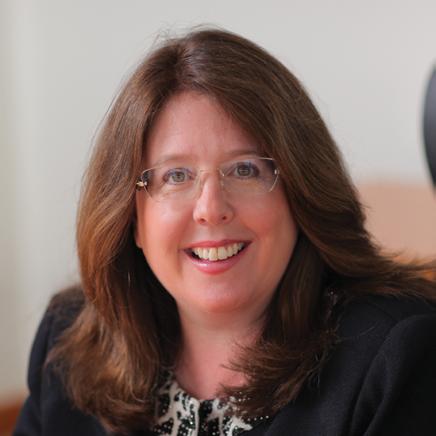
1
HOSTED 230 + Catholic leaders from 53 dioceses at the 2022 Catholic Partnership Summit
INVOLVED leaders from the U.S., Rome, and Belgium in the 2022 Catholic Partnership Summit
SHARED OUR MISSION WITH 60,000+ people in 38 engagements
GROWING IN OUR PARTNERSHIP:
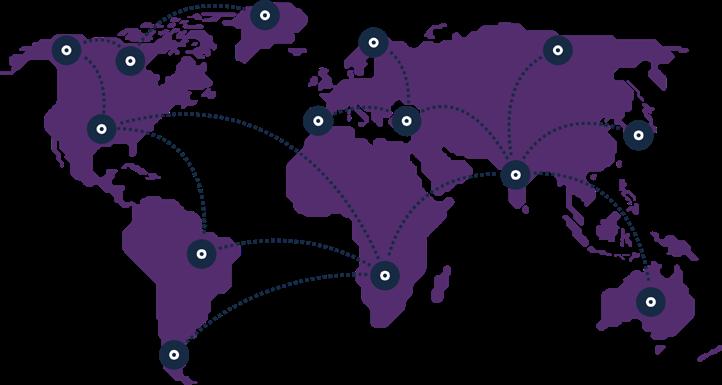
PARTNERED IN LAUNCHING a network of Diocesan Finance Council Chairs with representatives from 35 dioceses in the U.S.
GREW young adult formation with the addition of
2 NEW ESTEEM sites
COLLABORATED with USCCB and Vatican leaders in the Synod process
INVOLVED 5 U.S.-based Cardinals as co-hosts of the 2022 Catholic Partnership Summit
2 GROWING IN OUR MISSION:
DELIVERED
52 engagements with dioceses, parishes and Catholic organizations
EXPANDED our Board of Directors by adding more women and people of color to better reflect the diverse Church we serve
REACHED
26 more
Latino leaders through our Latino Pastoral Leaders Initiative for a total of 67 leaders formed
BECAUSE OF YOUR SUPPORT:
More than 1,000 pastoral leaders participated in our services and programs
CONVENED leaders from 40 National Catholic organizations in synodal consultations
CREATED a national Catholic Leaders Circle
for the directors of national Catholic nonprofits, institutions and initiatives to help foster ongoing synodal leadership formation
Leadership Roundtable was featured in
15 media articles, podcasts, radio programs, and television spots
GROWING IN OUR SERVICE: 3
LIVING SYNODAL LEADERSHIP
Early in his pontificate, Pope Francis prioritized synodality and becoming a synodal Church at every level, saying “The journey of synodality is the journey that God wants from his Church in the third millennium.”1
Leaders gathered at the 2021 Catholic Partnership Summit recognized the synodal journey as the path forward for a Church marked by crises. Just one month later, in October 2021, Pope Francis inaugurated what has become known as the Synod on Synodality — a global multi-year process of listening, discerning, encountering, and ultimately transforming the Catholic Church through consultation with the Holy Spirit and the entire body of Christ.
Cardinal Mario Grech, secretary general for the Synod, in his opening keynote address of the 2022 Catholic Partnership Summit, noted that the Synod is an ecclesial communion that involves everyone in the Church. As emphasized by the Second Vatican Council, all the baptized, lay, religious, and clergy, are called to be active participants in the mission of the Church.
The Synod on Synodality presented to Leadership Roundtable the unique opportunity to engage in the process and further the goal of becoming a synodal Church by leveraging our expertise in facilitating conversations and best practices, our convening power, and our relationships with a vast network of Catholic leaders.
Supporting the Synodal Journey
The year 2022 was a decisive moment in Church history. Called to rediscover the Church’s deeply synodal nature, more than 700,000 people in the United States alone gathered in nearly every diocese to engage in synodal consultations.
For the Church, the Synod began with a question: “What is the Holy Spirit saying to our Church today?” Our involvement in the Synod also began with a question. We were asked by Archbishop José Gomez, then-president of the United States Conference of Catholic Bishops (USCCB) to assist with the Synod process and by the Secretariat of the Synod at the Vatican to create a facilitation guide, a reporting guide, and a suggestion for how to synthesize reports.
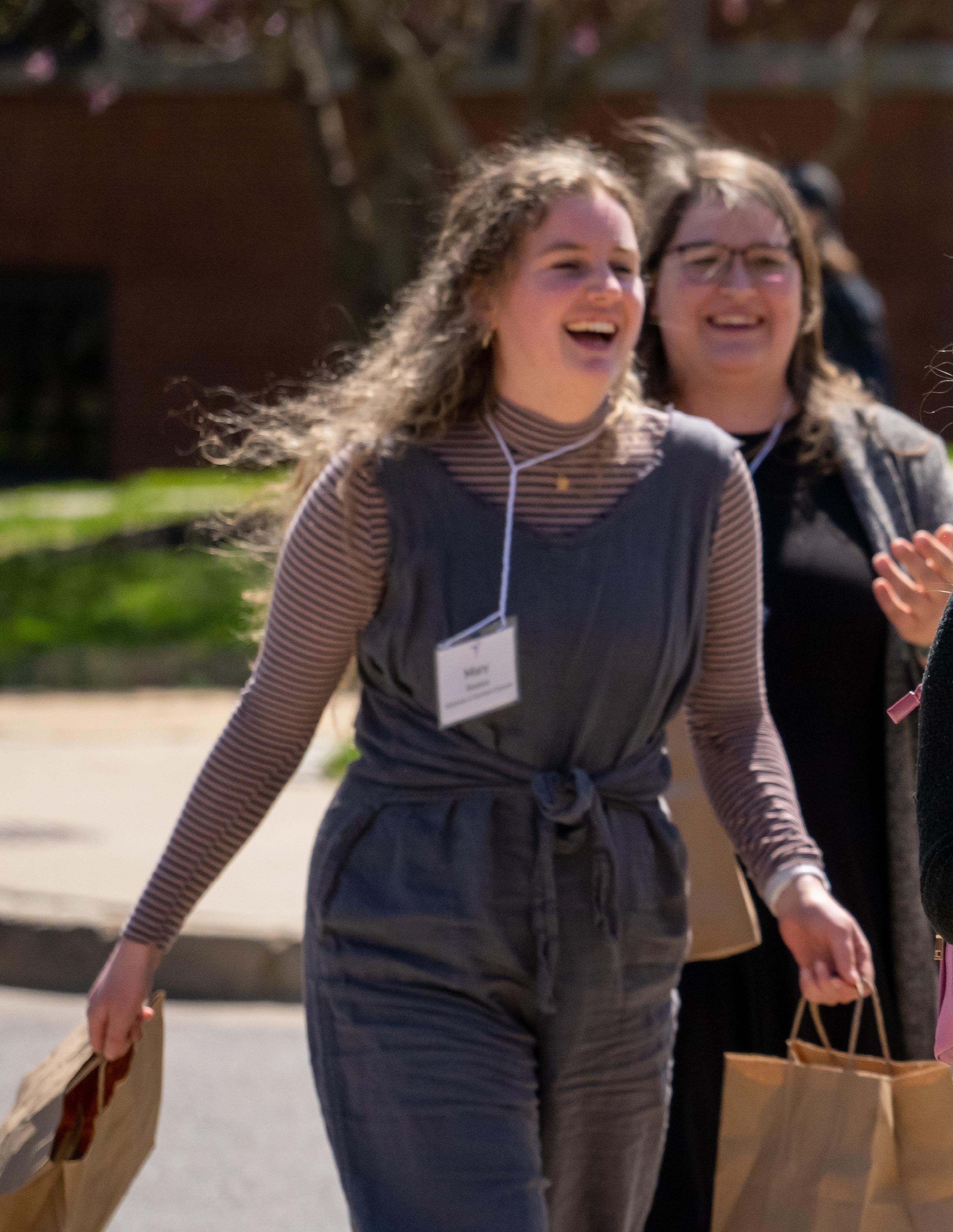
4
1. Wooden, Cindy. 2015. “Pope Calls for ‘Synodal’ Church That Listens, Learns, Shares Mission.” Catholic News Service. October 15, 2015. https://www.ncronline.org/pope-calls-synodal-church-listens-learns-shares-mission.
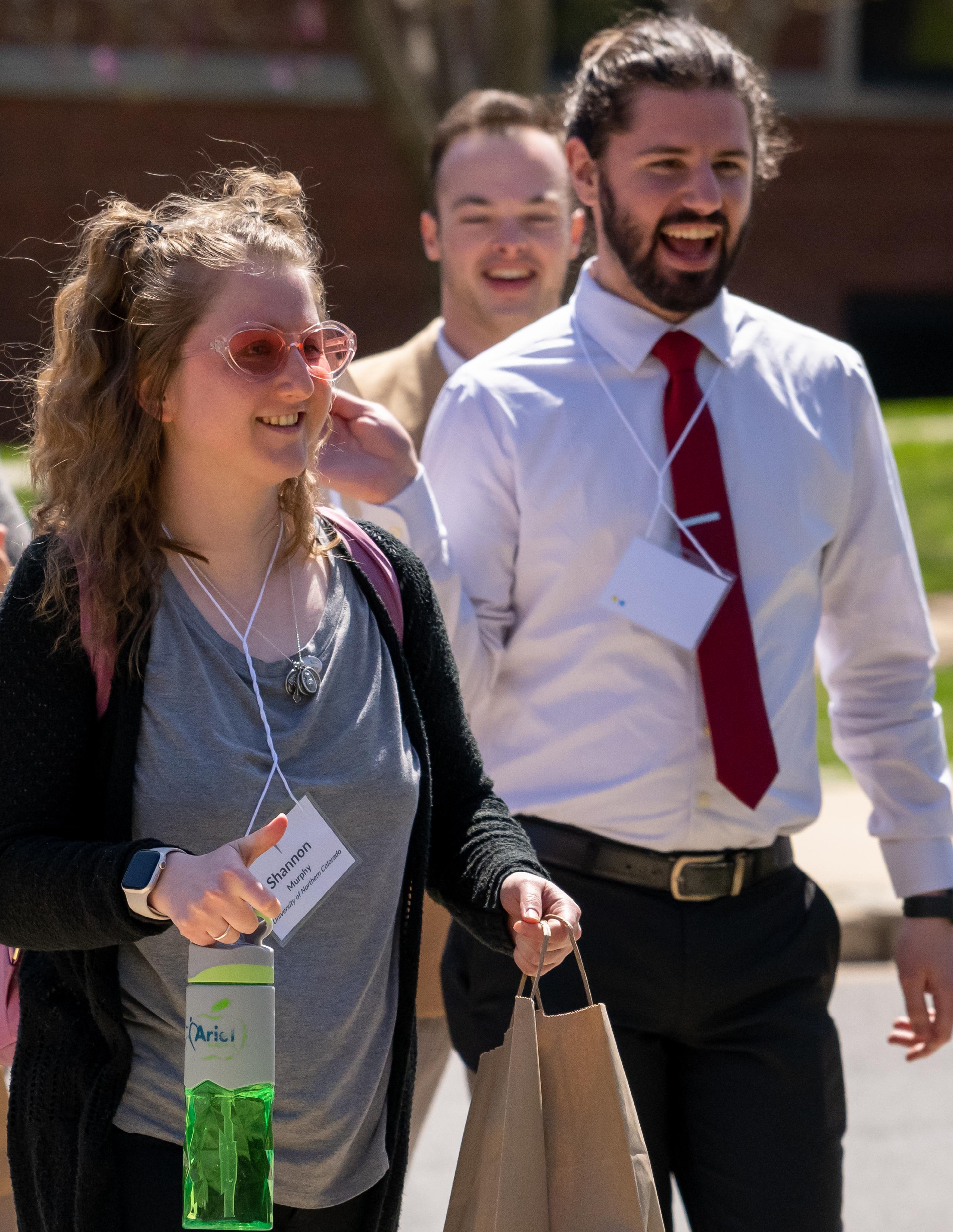 Participants at the 2022 ESTEEM (Engaging Students to Enliven the Ecclesial Mission) Capstone Conference.
Participants at the 2022 ESTEEM (Engaging Students to Enliven the Ecclesial Mission) Capstone Conference.
5
Photo Credit: Maximilian Franz Photography
By January 2022, Leadership Roundtable had hosted several independent consultations with dioceses to guide their Synod work, and we had curated our nearly two decades of collective thought leadership and expertise hosting similar gatherings into two foundational documents:
• Facilitating Synodal Consultations
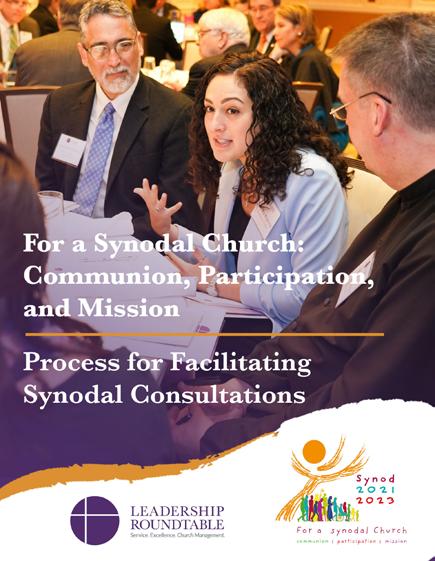
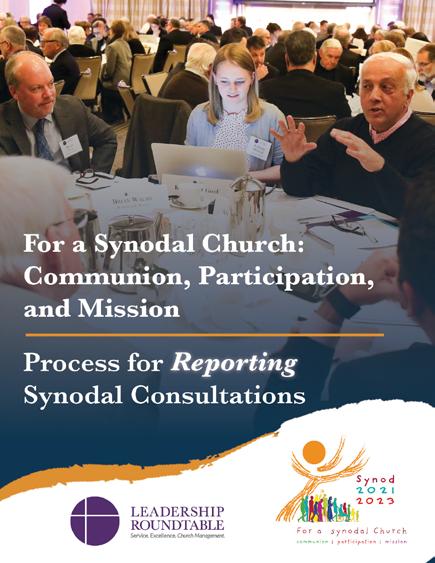
• Reporting Synodal Consultations.
story of synodality, exemplifying how simply listening and encountering one another can set hearts aflame.
In the past year, the Holy Spirit has worked through the Synod to rekindle a flame in the hearts of Catholics, evidenced by both how many Catholics took part and the results that so far have emerged.
Just days before Leadership Roundtable hosted our 2022 Catholic Partnership Summit in September, the USCCB issued its synthesis report on the Synod process in the U.S.
While the synthesis noted many issues weigh heavily upon the body of Christ — including the need to reconcile with those harmed by the Church and to heal from the ongoing crises of abuse and leadership failures, a desire for the Church to be more welcoming, acknowledgment of growing divisions and the need to unify, and a call to elevate and support more women as leaders — the synthesis showed that Catholics strongly desire the co-responsibility, accountability, and transparency that Leadership Roundtable promotes in Church leadership.
These documents offered dioceses a roadmap to the structure and processes for facilitating Synodal consultations, and a template and guidelines for synthesizing and reporting results to the diocese and ultimately, the bishops’ conference. Together, the documents captured as an official resource to the Church —the processes Leadership Roundtable has followed since our founding to convene leaders in dialogue surrounding major issues facing the Church, record the themes that emerge, and report the results to the Church leadership.
Available in English and Spanish, the two Synod documents were circulated for use globally by the Vatican and became a trusted resource for many dioceses as they consulted the People of God.
Setting Hearts Aflame
In the Gospel of Luke 24:13-35, Jesus appears on the road to Emmaus to two disciples after his Resurrection. During the encounter, the risen Jesus does not reveal himself as the Savior, rather, he simply walks and talks with them. After he departs, they say to one another, “Were not our hearts burning [within us] while he spoke to us on the way and opened the scriptures to us?”
The Gospel story of Jesus on the road to Emmaus is a
Concepts that nearly 20 years ago were met with opposition by some Church leaders now were emerging as top desires among Catholics. Grech noted at the Summit that nearly every country in the world that took part in the Synod raised similar issues. Globally, the syntheses echoed a call from the People of God to embrace the hallmarks of synodal leadership to help the Church thrive.
Supporting Synodal Leadership
Cardinal Grech and Pope Francis repeatedly emphasized that becoming a synodal Church requires more than a singular synod process. A synodal Church requires ongoing consultation with the People of God and a new leadership culture that remains open to the Holy Spirit, expands representation at the leadership table, communicates openly, and is accountable for its actions. It is the culture we’ve promoted in the Church since our founding.
Not just practicing, but actually living synodal leadership is a bold vision. As Cardinal Joseph Tobin said in a video message ahead of the 2022 Catholic Partnership Summit: “a synod is a meeting, synodality is a way of being church.”2 For many, synodal leadership is a new way of leading.
6
2. Leadership Roundtable. 2022. “Summit 2022 Cardinal Joseph W. Tobin: ‘Synodality Is an Invitation to Discover a More Profound Unity.’” Vimeo. Leadership Roundtable. August 17, 2022. https://vimeo.com/740460158.
Our outreach to the leaders of Catholic organizations in the United States early in the Synod process revealed a hunger for both support in building their synodal leadership capacity and for fostering a community among those undertaking the work.
Through three separate convenings of leaders from more than 40 national Catholic organizations during 2022, we introduced leaders to synodal leadership and invited them to engage in a synodal process at each convening so they understood how to facilitate similar conversations among their communities and how to lead in a synodal way.
Feedback from those who took part showed the value of gathering with similar leaders and sharing collective experiences and resources. It also highlighted a need to establish a community among the leaders where conversations could continue.
The need for formation in synodal leadership also emerged as a strong theme of the 2022 Summit from the more than 230 Church leaders who attended. During the two-day event, Leadership Roundtable committed to provide such formation.
A New Way of Leading
Responding to the need for synodal leadership formation and community among leaders, Leadership Roundtable formed in late 2022 a national Catholic Leaders Circle. Envisioned as a space for leaders to gather to continue their formation in synodal leadership, the Catholic Leaders Circle welcomed all those who had taken part in the earlier gatherings and is open to more leaders who want to join.
Within weeks of the Summit, we also identified Ten Core Concepts of Synodal Leadership and shared this resource among our network (see sidebar).
Through the Summit and other dialogues, we facilitated a new partnership between us, Discerning Leadership Program, the Leadership Conference of Women Religious (LCWR), and the Catholic Leadership Institute to create a new formation course in synodal leadership.
As we enter 2023, our work to support the Church in its synodal journey continues as we work with partners to develop the synodal leadership course and facilitate the ongoing national Catholic Leaders Circle.
TEN CORE CONCEPTS
of Leadership Formation for a Synodal Church
I.
Focusing on forming a new culture of leadership and on co-responsibility in decision-making, not just representation. This is particularly important for women in leadership roles and the diversity of people “around the table.”
II.
Emphasizing collaboration and the creation of a shared vision for parishes, dioceses, and other Catholic organizations and institutions.
III.
Avoiding clericalism by forming not bishops alone, but with their senior leadership team; not the pastor alone, but with his pastoral team; not professional lay ecclesial ministers alone, but with ministry leaders and volunteers.
IV.
Forming a cohort of learners so that both leadership and formation are understood as communal functions, not individual endeavors.
Integrating an underpinning of servant leadership across all our programs. V.
VI.
Providing programs within a context of formation, not education or training.
VII.
VIII.
Emphasizing discernment in how we discuss the role of consultative councils and in our approach to mentor training, leadership coaching, and peer coaching.
Focusing on leadership competencies that emphasize the communal dimension of leadership.
IX.
Supporting leaders in their formation through accompaniment as an intentional strategy.
X.
Always including self-assessment, evaluation, and impact assessment to ensure that we learn together from the process.
7
EXECUTIVE SUMMARY OF THE 2022 CATHOLIC PARTNERSHIP SUMMIT
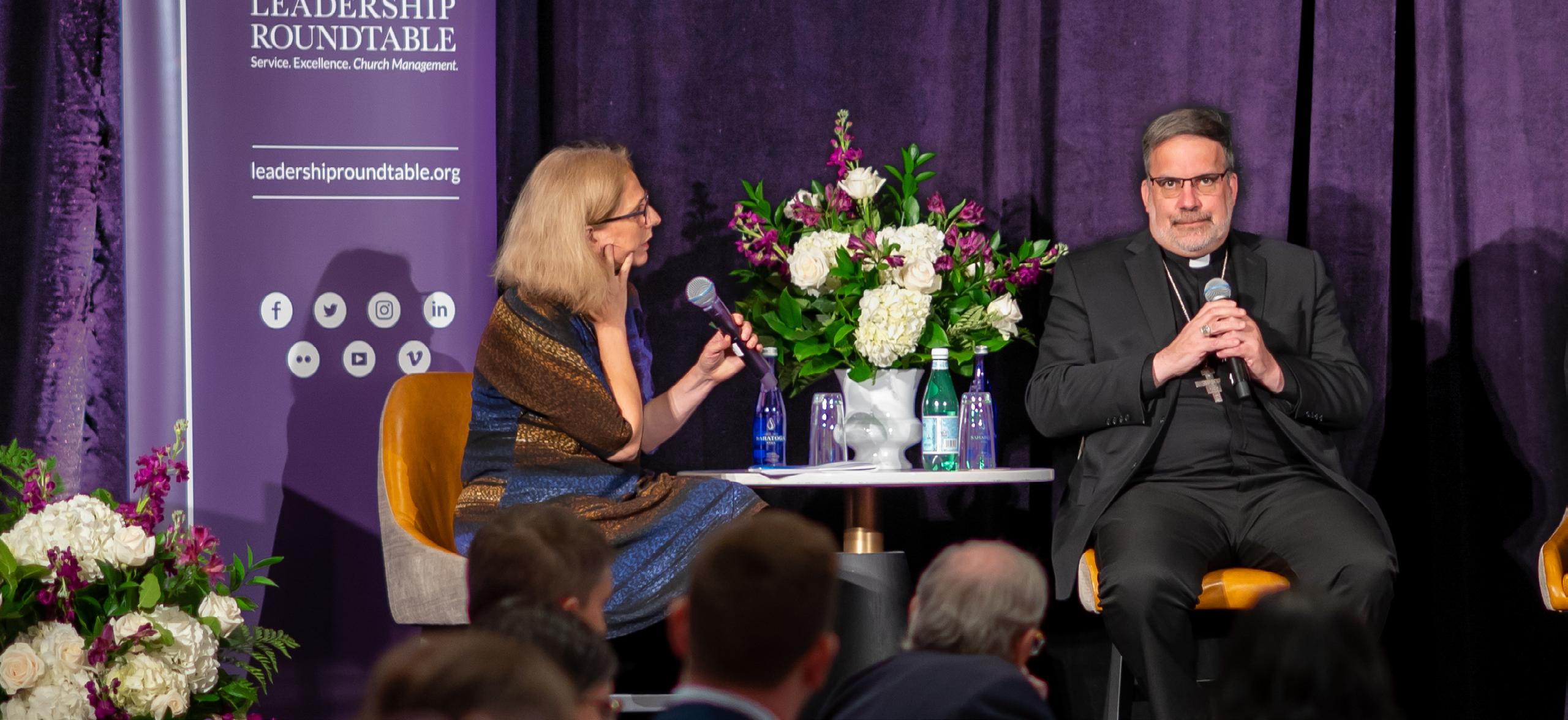
The 2022 Catholic Partnership Summit offered more than 230 leaders from 53 dioceses across the United States, Rome, and Europe the unique opportunity to collectively discern how we respond to the call to Live Synodal Leadership mere days after the United States Conference of Catholic Bishops released the results of the Synod in the United States.
The Summit, planned before most dioceses held consultations with the People of God, sought to facilitate discussions among Catholic leaders of how we live synodal leadership as we work to become a synodal Church. The Summit asked attendees to focus on four vital issues relevant to living synodal leadership — Our Synodal Roadmap, Being One Church, The Vital Role of Women’s Leadership in the Church, and Emerging
Models of Leadership in Practice. As evidenced by the results of the Synod in the U.S., the Holy Spirit had these same issues on the hearts of the People of God.
Pope Francis has emphasized that “synodality is an ecclesial journey that has a soul that is the Holy Spirit.” Throughout the 2022 Catholic Partnership Summit we consciously offered space and welcomed the Spirit to guide the discussions and the work to formulate actionable recommendations for living synodal leadership at all levels of the Church.
This executive summary contains major themes that emerged from Summit speakers and small group discussions.
8
Our Synodal Roadmap
Create a synodal Church culture
Pope Francis has called upon the Church to become synodal — listening to the Holy Spirit, engaging all members of the body of Christ, especially those historically marginalized, in dialogue and discernment. Through promoting and understanding the results of the Synod on Synodality, working to build synodal structures into the operations of the Church, investing in the formation of leaders in synodal leadership, and continuing to regularly consult with the People of God, we respond to this call and build a truly synodal Church.
Prioritize accountability
Accountability is a key element in building synodal Church culture and restoring trust with the People of God. Ensuring that each parish and diocese has active, functioning boards, councils and committees, as well as cultivating and supporting leaders within each faith community, our Church can build accountability and ownership at every level.
Invest in formation
As the Church strives to become more synodal, there is a need for ongoing communication, informationsharing, and transparency so the ideals and purpose of synodality are understood and the outcomes are realized. From developing and sharing resources for
formation in synodal leadership and the principles of synodality to creating communications that clearly and easily help people understand synodality, the Church must actively work to ensure synodality is part of leadership culture.

Listen to people on the margins
Synodality requires leaders to seek out and engage with a diverse mix of individuals, particularly those historically excluded, those on the margins, and those who have left the Church. However, the Church must also welcome those on the margins to active life in the Church. This includes prioritizing having a diversity of experience and thought represented in all leadership and decision-making bodies, and actively engaging those who have been historically excluded.
Being One Church
Prioritize inclusivity
It is vital for the Church to strive to include all members of the body of Christ in Church life, especially the marginalized — young adults, people of color, women, low-income individuals, and LGBTQ Catholics. Leaders can foster inclusion by evaluating organizational structures, identifying authentic ways of engaging with communities that are largely absent from leadership and creating structures that prioritize and actively seek to ensure diversity of representation in all leadership circles.
9
(left to right): Amy Uelmen, Bishop John Stowe, OFM Conv., Shannen Williams, Bob Bordone
Strengthen unity through dialogue and conflict transformation
The Church needs to become a model for, and a teacher of, how to live in unity among the great diversity and polarization of our world with a particular focus on charitable dialogue and conflict resiliency. As with other challenges that have faced the Church in the past, the work to become a synodal Church presents an opportunity to create and facilitate spaces of transparent dialogue where conflict can be addressed openly and where every participant is treated with dignity and respect.
Acknowledge the truth of the past and be agents of transformation
For positive transformation to occur, we must do the hard work of changing the ways we lead in the Church by encouraging leaders to find energy to learn new things and change patterns. The Church can no longer ignore the sin of racism. Rather, it must commit to identify and to remove racist policies or practices, and to seek ways to make amends with those who have been harmed. It must foster real relationships among people of different racial and ethnic backgrounds and promote leadership qualities such as humility, vulnerability, openness, and curiosity.
The Vital Role of Women’s Leadership in the Church
Respect and elevate women’s leadership
Women play a vital and expanding role in the health and vitality of the Catholic Church. The Church needs to create and implement human resources policies that better reflect the role of women in our Church and society. This includes identifying positions that can be held by women but currently are not, seeking to address pay disparity, adopting a generous paid parental leave policy to support women both as mothers and workers, and actively recruiting women to serve in leadership.
Expand leadership opportunities for women
There is a strong desire among the People of God for women to serve in greater leadership capacities within the Church, but there are still structural and cultural barriers that need to be addressed. Reviewing leadership structures and revising job titles or creating new positions all allow more access to leadership for women. The Church must ensure women and lay
leaders are present at all decision-making tables of its parishes, dioceses, and Catholic organizations.
Promote women’s leadership roles in the Church
Transparency regarding how many women serve in Church leadership and the roles that are open to women are vital for building a co-responsible culture. Women hold many leadership positions in the Church, yet their stories largely go untold. Recognizing the many women who are currently serving in leadership, sharing their stories, and working to ensure more women are given the opportunity to speak for the Church all help raise awareness of women’s leadership.
Include women in seminarian formation
To shift the leadership culture of the Church toward greater co-responsibility, the presence of women in leadership roles within seminaries and within the early and ongoing formation of clergy is critical. The Church must consider intentionally and actively including women in governance, teaching, and formation at seminaries, involving women in the process of determining whether a seminarian is fit for ordination, and establishing an early and ongoing formation process for clergy that directly involves women.
Prioritize connection and community for women leaders
Women face unique challenges as leaders in the Church and often are the only woman at the table. Promoting women’s leadership requires also providing peer support, community, and means of connection for those who take on leadership. As well as creating and supporting spaces that offer women leaders connection, advancement, leadership development, and community, the Church must prioritize the mental and spiritual health of women leaders.
Emerging Models of Leadership and Faith in Practice
Provide structured feedback opportunities for leaders
Leaders who receive feedback are stronger and better equipped to lead. The Church must actively seek ways for the People of God to offer feedback to leaders so that accountability and inclusion of diverse perspectives becomes a hallmark of their approach to leadership.
10
Create agile, responsive leadership structures
Leadership structures cannot remain as they are if the Church is to continue to heal, strengthen, and thrive. Rather, it must adapt to be transparent and responsive while still meeting the needs of those the Church serves. The Church has the opportunity to learn from different models of governance that include lay professionals working in partnership and to facilitate regular contact between those in leadership and the broader stakeholder community. Exploring methods of shared governance utilized in other sectors allow the Church to explore what other approaches could be applied to Church leadership structures.
Invest in young adults and people of color as leaders
Young adults, Hispanics/Latinos, and people of color have been historically excluded from leadership. The Synodal process has presented the opportunity for the Church to invest in, and include, these communities
going forward by creating mentoring and leadership training programs to help transition into leadership roles, welcoming them to our parishes, and providing multiple ways for them to connect to the parish and providing pathways to leadership and active Church life.
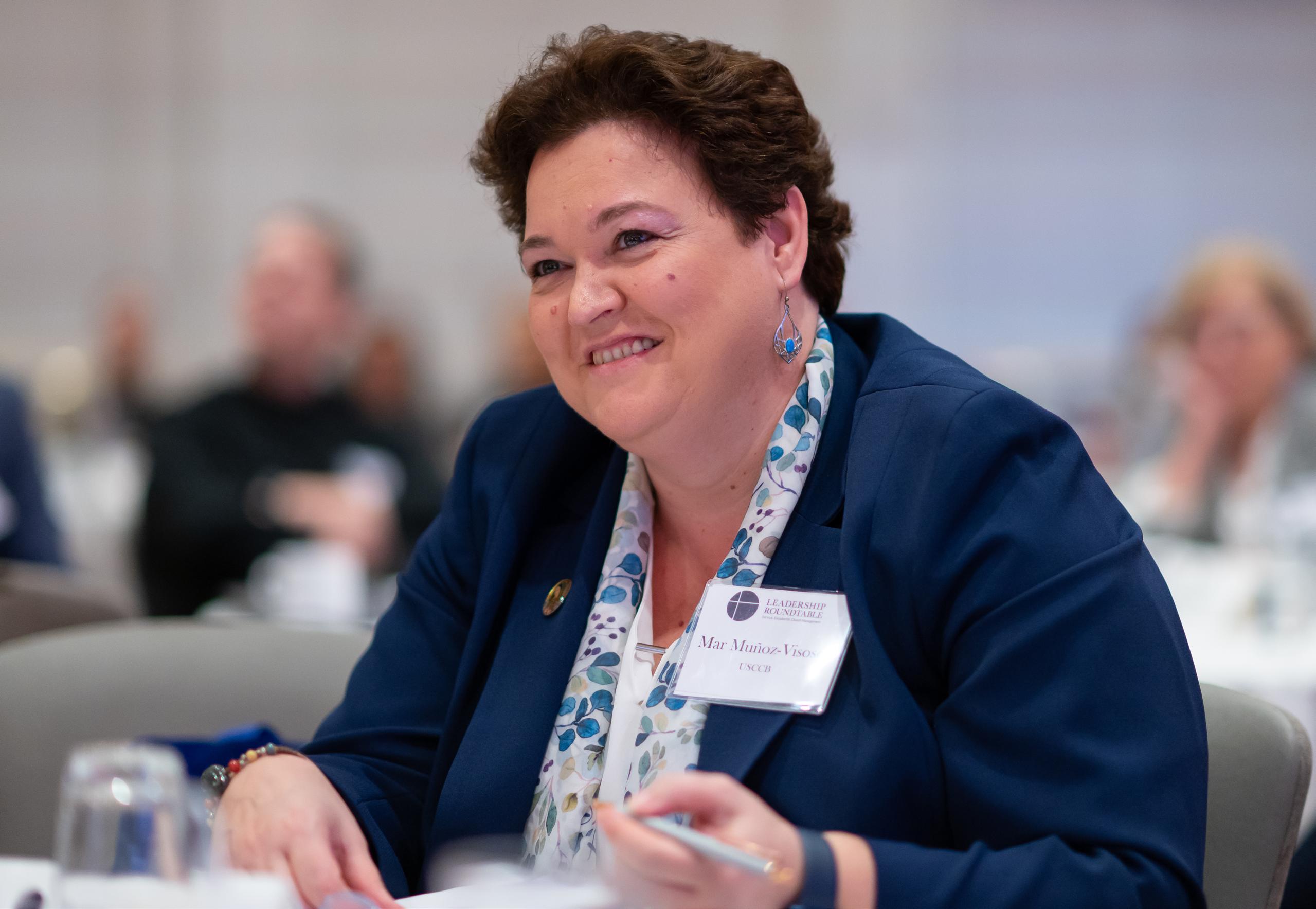
Encourage and support innovation
A key part of the Synodal process involves openness and commitment to expanded and innovative methods of leadership, governance, outreach, and evangelization in the Church. Encouraging and supporting innovation is part of how the Church will remain relevant and agile in carrying out its mission. Through supporting new initiatives with leadership and funding, being open to change, disruption of the status quo, failure, and discomfort, as well as creating spaces to encourage and support innovation, the Church can thrive.
11
Mar Muñoz-Visoso
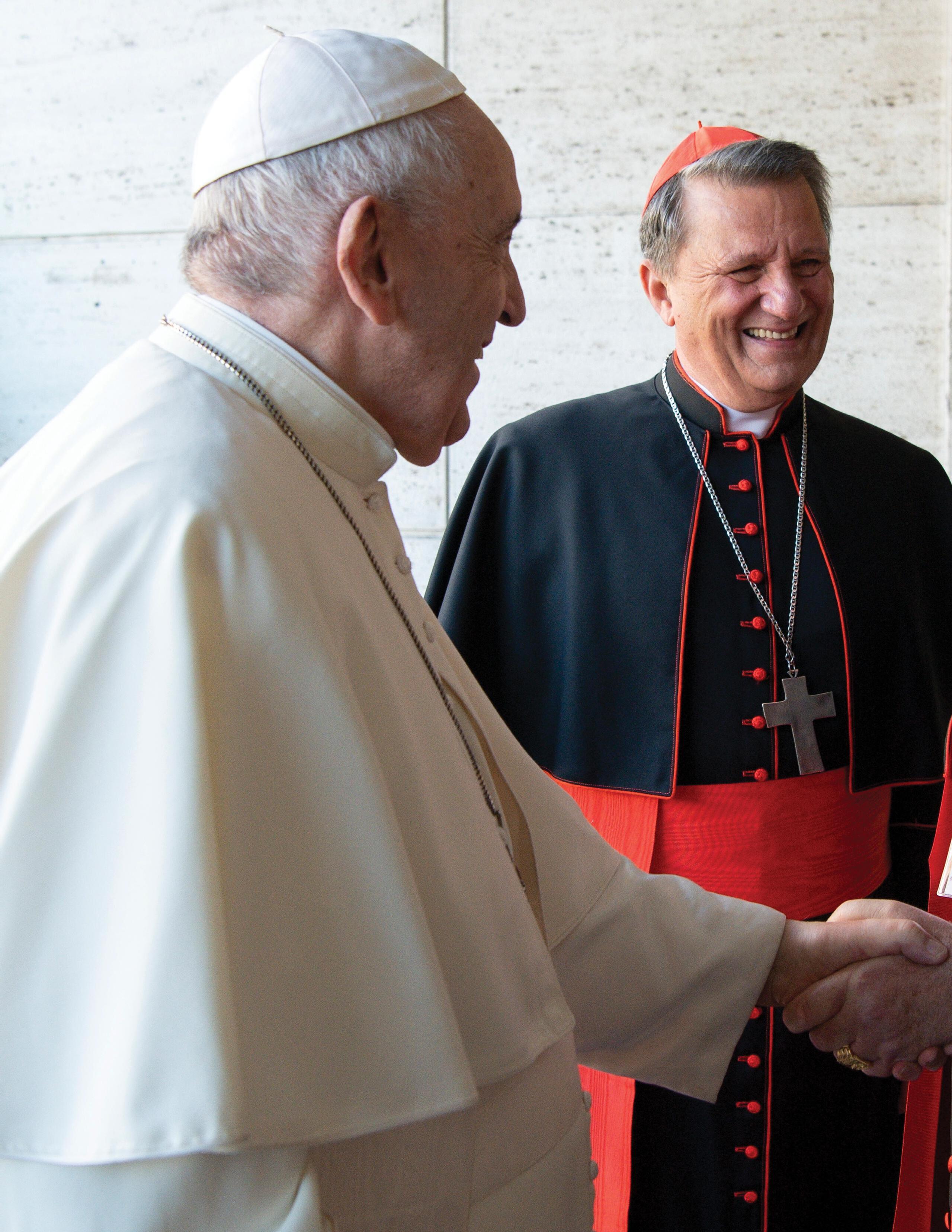
12
Cardinal Mario Grech with Pope Francis at the opening of the 2021-2023 Vatican Synod.
(Source: Office of the Secretary General of the Synod of Bishops)
Scriptural and Theological Understanding of Synodal Leadership
by Rev. J. Bryan Hehir
Introduction
The Synod on Synodality has raised among the People of God many issues which have led the Church to consider both how it operates and how it leads. The call to synodality and becoming a synodal Church from Pope Francis presents a bold vision for the future of the Church.
In the following essay, Rev. J. Bryan Hehir, Secretary for Health and Social Services, Archdiocese of Boston, Montgomery Professor of the Practice of Religion in Public Life, Harvard Kennedy School (Retired), and member of Leadership Roundtable’s Board of Directors, offers insight into the comments offered by Cardinal Mario Grech during his keynote at the 2022 Catholic Partnership Summit, an understanding of the Synod as an ecclesial event, and a history of synodality in Pope Francis’ pontificate as context for this report and the recommendations it puts forth.
Living Synodal Leadership
The 2022 Catholic Partnership Summit took as its title and theme, “Living Synodal Leadership: Our Call to a United Church.” Appropriately, the gathering was addressed virtually by Cardinal Mario Grech, the Secretary General of the Synod of Bishops, who took time away from his work reviewing thousands of Synod reports from across the world to offer a special address to the leaders gathered in Washington, D.C.
In his vigorous presentation filled with hope and enthusiasm about the progress of the Synodal process
thus far, Cardinal Grech highlighted themes from the many talks the Holy Father has given during the past several months about the purpose and methods of the Synodal journey. The dominant idea, which Pope Francis returns to often, is that the “Protagonist” of the Synod is the Holy Spirit. As the Holy Father has made clear, the Church is called to listen to, and watch for, the guidance of the Spirit at each stage of the Synod’s development. Equally important is the recognition that the Synod is an ecclesial event arising from the nature of the Church.
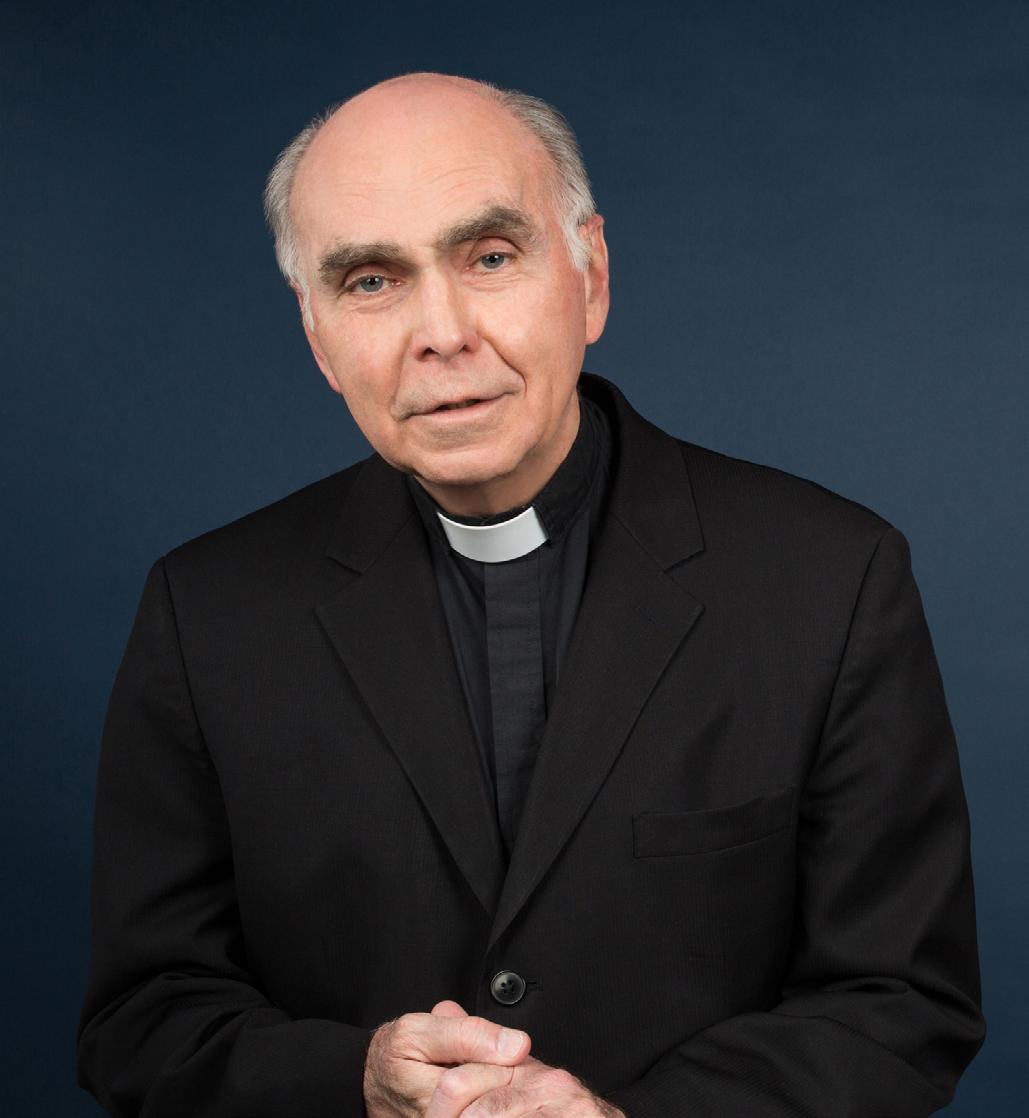
13
J. Bryan Hehir
As Cardinal Grech noted in his presentation, the Synod is not a parliamentary meeting or simply one surveying public opinion in the Church today, but a genuine listening to the People of God and the Holy Spirit.
It is important to understand the ecclesial nature of the Synod, detailed by Cardinal Grech and envisioned by Pope Francis, as it forms the basis for all that took place during the 2022 Catholic Partnership Summit and all that is presented here in this report.
To understand the Synod as an ecclesial event, we look first to the Second Vatican Council, the great ecclesial event of the last century which was the catalyst for our synodal work today. Next, we consider the major themes used by the Holy Father in describing the Synodal process, so we can lastly understand the role of the 2022 Catholic Partnership Summit and its resulting recommendations as a part of our ongoing work to become a synodal Church.
Vatican II: The Ecclesial Event of the Century
The Second Vatican Council, the twenty-first ecumenical council in the history of Catholicism, was the only council meeting that focused on the Church itself. The two principal texts were “The Dogmatic Constitution on the Church (Lumen Gentium)” and the “Pastoral Constitution of the Church in the Modern World (Gaudium et Spes).”
Lumen Gentium arose early in the first session of the Council and became a touchstone for the bishops throughout the rest of the Council. While the conciliar document did not address the concept of synodality directly nor give it the weight Pope Francis has provided for it, the point to be made here is that embedded in Lumen Gentium are ideas which provide a foundation for the role of synodality in the Church. These ideas include:
1. The Church as a communion in itself and a communion among local churches;
2. Collegiality as the principle which joins the bishops of the universal Church with the Pope in the governance of the whole Church;
3. The primacy of the Church as community
which the institutional church is designed to serve;
4. The emphasis on the role of the laity throughout the Council.
In the planning for the Council, it was always envisioned that a document on the internal life of the Church would be central. The companion text, Gaudium et Spes: was not expected; this last document of Vatican II was the surprise of the Council; it grew out of the Council itself. In the post-conciliar era of the Church, however, Gaudium et Spes has been seen as the complement to Lumen Gentium. It now provides the ecclesial foundation for the Church’s social ministry and teaching. Its entire content reinforces Pope Francis’ repeated teaching that synodality is not simply about the Church, but about the Church’s service to the world.
Pope Francis on Synodality
The concept of synodality is not a new idea. It is rooted in the Christian tradition and has long been a staple of the polity of Eastern Orthodox and Easternrite Catholic Churches. Pope Francis clearly sees it as a needed catalyst for the Church today. Popes often leave a legacy of their service to the Church, and Francis’ legacy will be importantly tied to the impact of synodality on Catholicism. Much of what he says about synodality reflects broader dimensions of his papacy.
First, the process of synodality is a journey—a walking together as an ecclesial community.
Second, the journey in turn involves an exercise of discernment.
Third, discernment, in turn, engages the Church, in all its members, in an encounter with the “Protagonist” of the journey, the Holy Spirit.
Fourth, a key objective of this process of synodality is inclusion, the invitation to the entire Church to be active participants in the journey. Inclusion has been a goal of this papacy since its inception; the call to the Church at every level to reach out to the margins of societies, to the “existential peripheries” which exist in the Church and in society, locally, nationally, and globally.
14
Fifth, the dynamic of the journey of synodality requires a process of listening among the participants; listening in the Holy Father’s conception is the key to unity in the Church.
Sixth, the Pope specifies the goals of synodality in three terms: communion, participation, and mission. These are extensions of Vatican II, terms found there but needing a new infusion of grace and effort in the Church today.
From Rome to Washington: 2022 Catholic Partnership Summit
Leadership Roundtable, through its staff and Board, has been deeply committed to Pope Francis’ call to shape a synodal Church. Among the many goals of synodality Leadership Roundtable has focused on, the requirements for the leadership needed at every level of the Church, from the papacy to the parish, is essential if synodality is to realize its potential. From its inception, Leadership Roundtable has focused on creating a “culture of co-responsible leadership,” which in many ways has prepared it to be a valuable partner in the journey of synodality.
In four working sessions, the 2022 Catholic Partnership Summit brought together leaders with deep and
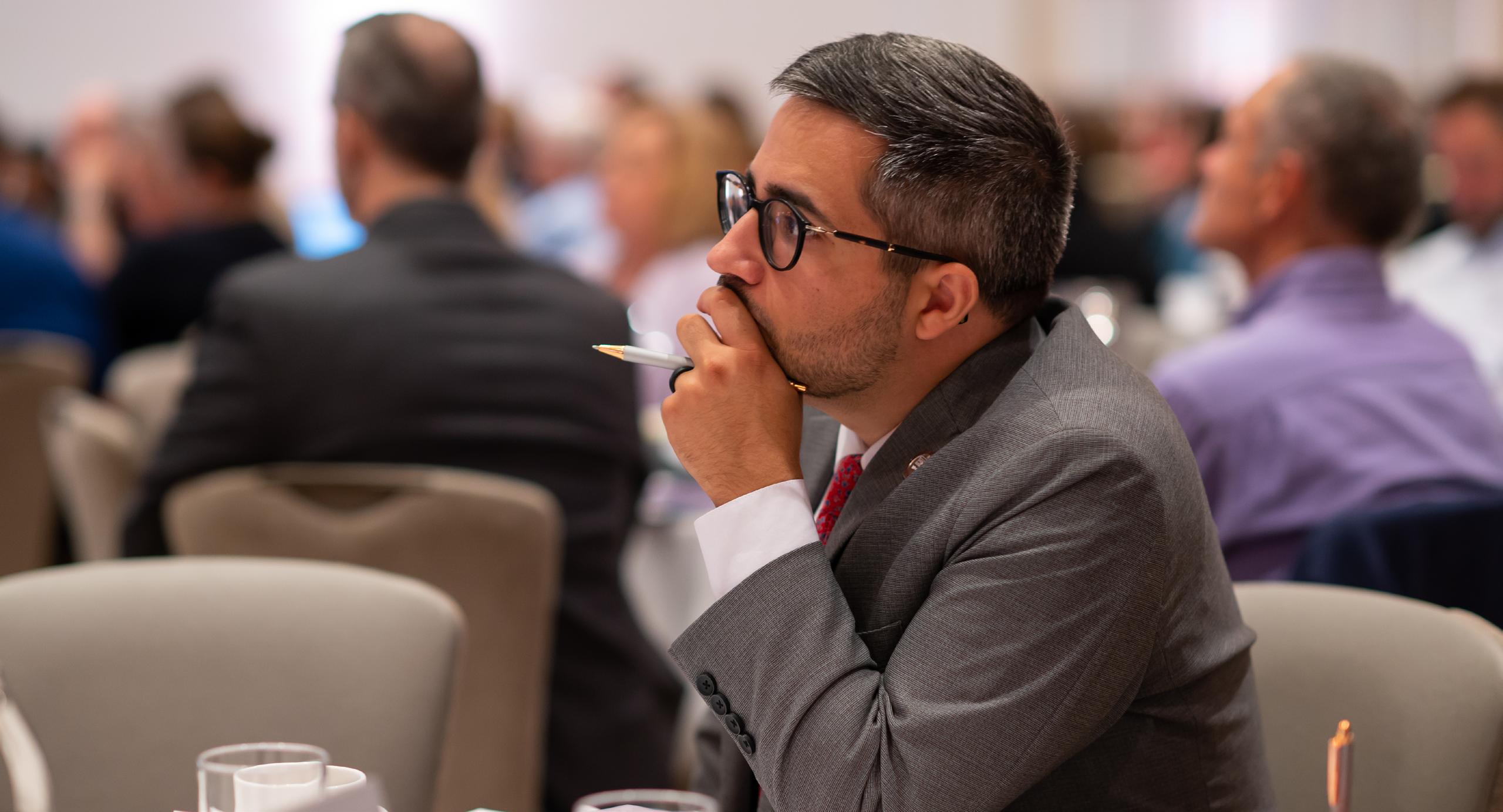
diverse experiences in the Church and civil society. The participants represented a wide range of organizations, a diversity of professional backgrounds and education, and a common commitment to the life of the Church. In many ways the panels creatively represented intergenerational experience as well as ethnic and racial diversity.
By moving from a generalized assessment of synodality in the first session through issues of engaging pluralism in the Church and by focusing particularly on the role of women in shaping Catholic life, the four sessions created both a sense of solid hope for the future and a catalog of challenges for the journey of synodality.
Catholic Partnership Summit Report
The upcoming publication of the report on the 2022 Catholic Partnership Summit is meant to share with readers our sense of hope and our commitment to the journey before the Church in 2023 and 2024. The report’s purpose is to engage readers in the synodal journey, to catalyze conversation from the parish to the Synod itself in 2023 and 2024, and to engage leaders at many levels of the Church the way the participants at the Catholic Partnership Summit shared through their ideas, their recommendations, and their plans to enhance the life of synodal Catholicism.
15
Andrew Ouellette
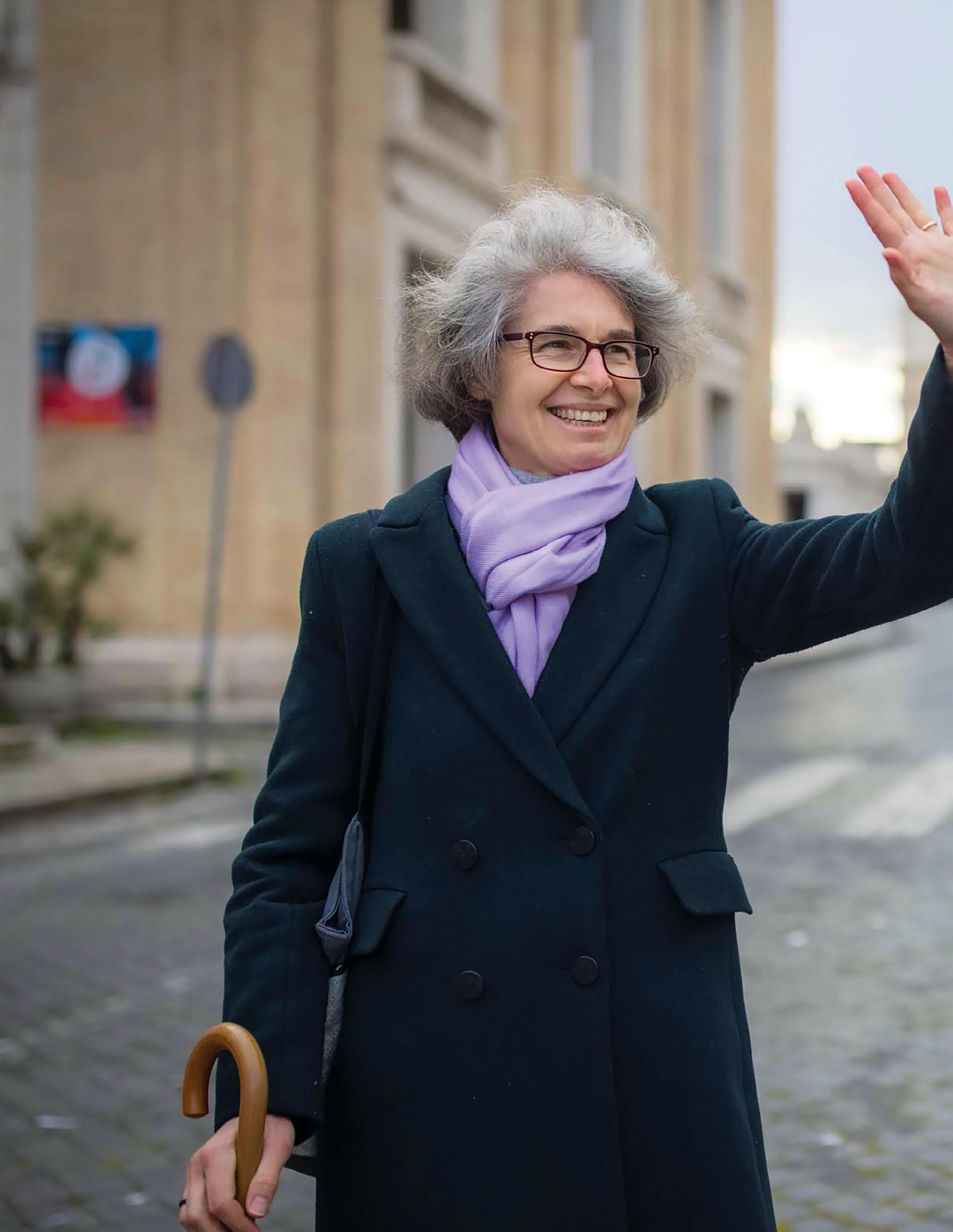
16
Sr. Nathalie Becquart, XMCJ, is the first woman to hold a voting role at the Synod of Bishops.
I have seen that in the Vatican, every time a woman comes in to do a job in the Vatican, things get better… Women know how to find the right way, they know how to move forward.
–POPE FRANCIS
Women’s Leadership in the Church
From landmark Vatican appointments of women to leadership roles previously only held by men, to the record number of women heading Catholic organizations, the vital impact of women in the Catholic Church is growing.

Across the globe, the People of God have called upon the Church during the ongoing Synod on Synodality to open even more doors, allow more women to step into greater leadership roles, and to recognize the women already making contributions to the life and mission of the Church.
In the words of Pope Francis: “I have seen that in the Vatican, every time a woman comes in to do a job in the Vatican, things get better…Women know how to find the right way, they know how to move forward.”1
Recent expansions for women’s leadership signaled that now was the time to bring this topic to the fore at our 2022 Catholic Partnership. The Summit allowed us to host a long-awaited panel on The Vital Role of Women’s Leadership in the Church and facilitate critical conversations among more than 230 leaders as to how our Church continues to recognize and expand women’s leadership not just in the Holy See, but among dioceses and parishes.
Women’s Leadership as Best Practice
Increasing women in leadership is a best practice recognized across all industries, from Fortune 500 companies to nonprofit organizations and government, and it is a value upheld by Leadership Roundtable since its inception in 2005.
“We know just from women in organizations that you bring one or two and they start inviting others. Once you have a diverse board, the board will remain diverse because people will draw from the different communities,” said Sr. Teresa Maya, CCVI, leader in the religious order of the Sisters of Charity of the Incarnate Word and recently appointed member of Leadership Roundtable’s Board of Directors.
The mission of Leadership Roundtable includes promoting “greater incorporation of the expertise of the laity.” The nature of the Church is such that all women are laity, including religious women. Through our work, we encourage the integration of more laity into the leadership of the Church, whether they are sitting on boards, finance councils, pastoral councils, or offering their expertise in education, finance, administration, or ministry.
17
1. Dicastery for Communication. 2022. “Pope Francis: ‘Three World Wars in One Century: Be Pacifists!’ Vatican News.” www.vaticannews.va. November 6, 2022. https://www.vaticannews.va/en/pope/news/2022-11/pope-flight-three-wars-century-pacifist-interview-bahrain.html.
Our mission drives us to ensure that we model the best practices we promote. Today, we have a staff that is more than 60 percent women, led by a team of four Executive Partners, two of whom are women. On our board, our most recent appointments have all been women.
In 2022, Christina Lamas, executive director of the National Federation for Catholic Youth Ministry (NFCYM) and Sr. Maya both joined our board. In 2021, British Robinson, president and CEO of the Barbara Bush Foundation for Family Literacy, also joined our board.
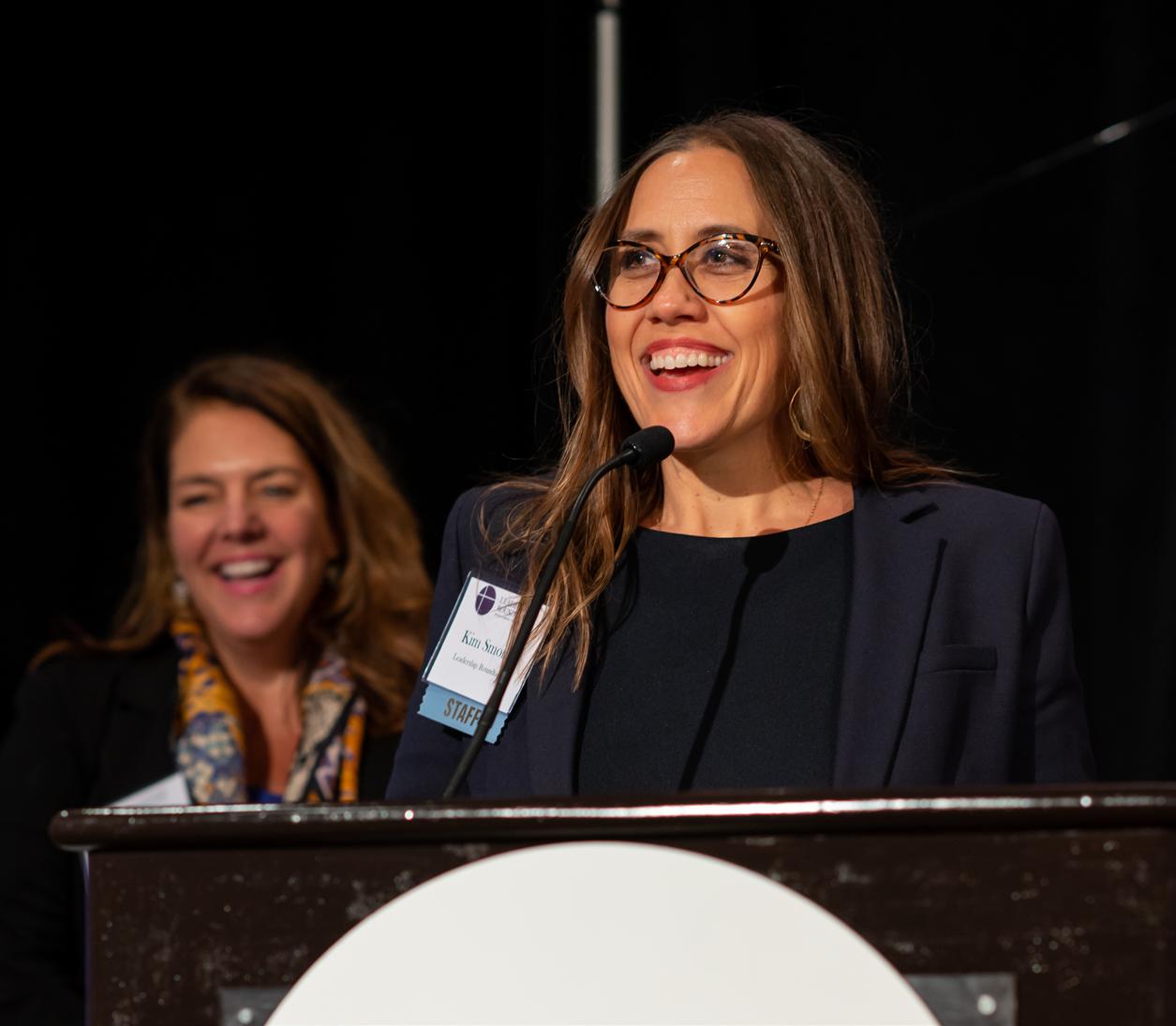
While we encourage the Church to appoint more women to leadership roles, Lamas cautioned against appointing women simply to check a box.
“Our gender is a piece of who we are, but it is only a fraction of what we bring to the table and the whole package that God created us to be,” she said. “To be labeled, or to be invited to a certain leadership position because you are of a gender, or of a culture, or of an age group misses the whole opportunity. But we also know the importance of good representation, and so organizations must be able to create a matrix internally to be sure that all demographics are represented.”
In short, striving for representation “should never trump passion for a mission,” she said.
Women’s Passion for the Church
Research shows there is no shortage of passion for the mission of the Church among women. More than half of practicing Catholics are women and the 2014 Religious Landscape Study by Pew Research found women report being more active than men in parish and faith life — women more frequently attend Mass, engage in prayer, and participate in parish ministries.2
“Women are not the guests of the Church. And we don’t need invitations. We are members of the family,” said Dr. Carolyn Woo, former CEO of Catholic Relief Services. Dr. Woo is also the author of the book Rising: Learning from Women’s Leadership in Catholic Ministries.
Dr. Woo spoke at our 2022 Catholic Partnership Summit as part of the panel on the Vital Role of Women’s Leadership in the Church. Together with Sr. Maya, she was joined on the panel by:
• Casey Stanton, co-director of Discerning Deacons
• Kathleen McChesney, founder and CEO of Kinsey Consulting and former head of the Office of Child Protection at the United States Conference of Catholic Bishops (USCCB)
• Alexandra Carroll, communications manager for Social Mission, Department of Justice, Peace and Human Development, USCCB (moderator).
The panel resonated deeply with Summit attendees, many who remarked that women’s voices are historically not often the loudest or the most prominently featured at convenings and liturgical gatherings.
2. Pew Research Center. 2015. “Religious Landscape Study.” Pew Research Center’s Religion & Public Life Project. May 12, 2015. https://www.pewresearch.org/ religion/religious-landscape-study.
Women are not the guests of the Church. And we don’t need invitations. We are members of the family.
–DR. CAROLYN WOO
18
Kim Smolik (front) Kerry Robinson (back)
Roughly half of the world’s population are women, so it is imperative that women are represented in critical aspects of the Church’s work, Robinson said.
In researching her book, Dr. Woo found that women have greater or comparable representation in leadership in the Church than in the private sector. One-third, or about 33 percent, of Catholic universities and Catholic health systems are led by women. Half of Catholic charities in the U.S. are led by women, including the national Catholic Charities USA, as are Catholic school systems, of which 50 percent are led by a female superintendent.
A 2015 survey3 on diocesan leadership found about onethird or 33 percent of top diocesan positions including chancellor, Chief Financial Officer, Chief Operating Officer, etc. are held by women, up from about 27 percent reported by the United States Conference of Catholic Bishops (USCCB) in 2003 as part of a survey in response to a call in the 1998 publication From Words to Deeds to increase women’s leadership in the Church.4
Comparatively, in the private sector, only 9 percent of Fortune 500 companies are led by women CEOs, while 47 percent of all U.S. colleges and universities have female presidents.
The Global Call to Expand Women’s Leadership
The discussion at the Summit came at a crucial time in the Church, occurring just days after the USCCB released its synthesis document summarizing the results of 22,000 surveys and consultations with more than 700,000 Catholics in the United States.
The synthesis made clear that women’s leadership was at the forefront of the conversation during Synod in nearly every diocese in the United States stating that:
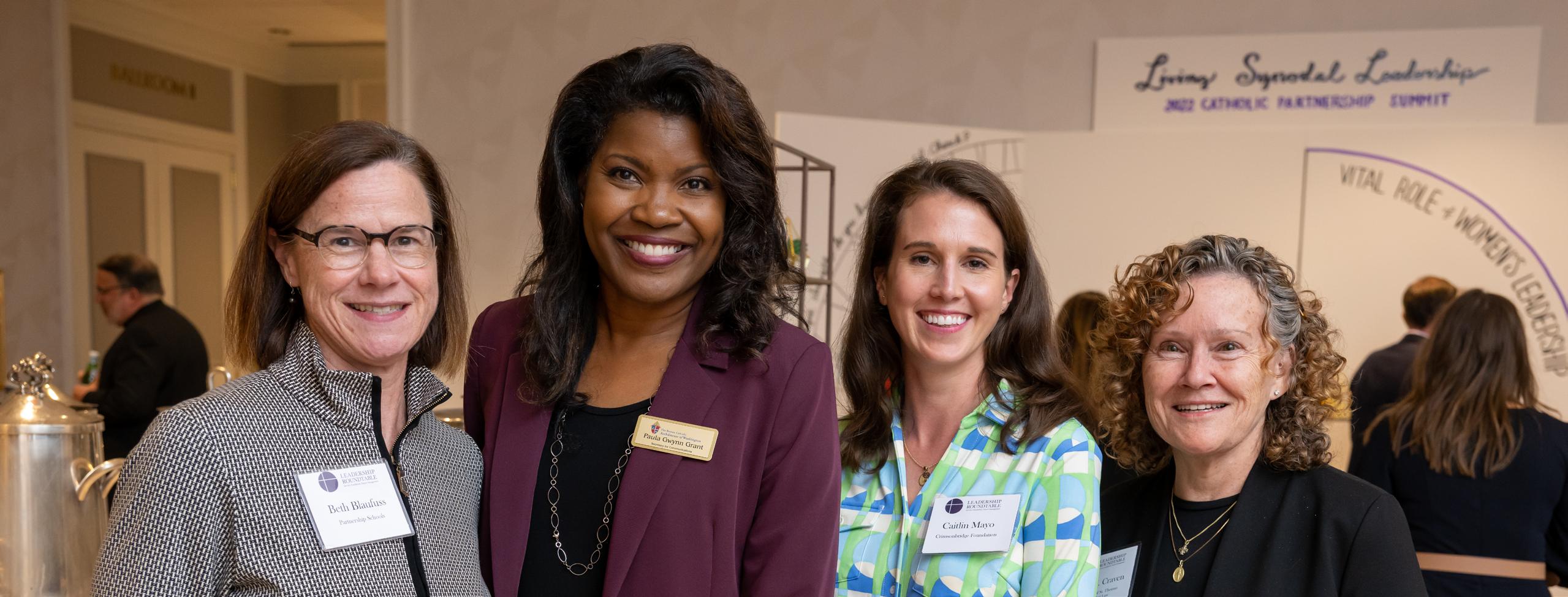
Nearly all synodal consultations shared a deep appreciation for the powerful impact of women religious who have consistently led the way in carrying out the mission of the Church. Likewise, there was recognition for the centrality of women’s unparalleled contributions to the life of the Church, particularly in local communities.6
Participants also voiced their desire for “stronger leadership, discernment, and decision-making roles for women.”7
In October, the Vatican released a working document titled “Enlarge the space of your tent,” which shared
3. O’Loughlin, Michael. 2015. “Most US Dioceses Have Women in Key Posts, but Some Have None.” Crux Now. Crux. May 15, 2015. https://cruxnow.com/church/2015/05/women-us-catholic-dioceses-leadership-data.
4. The National Association of Church Personnel Administrators. 2004. “Women in Diocesan Leadership Positions: Progress Report, 2003.” Washington, D.C.: United States Conference of Catholic Bishops Committee on Women in Society and in the Church.
5. Women Business Collaborative. 2022. “Women CEO Report.” Women Business Collaborative. 2022. https://www.wbcollaborative.org/women-ceo-report/.
6. United States Conference of Catholic Bishops. 2022. “National Synthesis of the People of God in the United States of America.” https://www.usccb.org/resources/US%20National%20Synthesis%202021-2023%20Synod.pdf.
7 United States Conference of Catholic Bishops. “National Synthesis of the People of God in the United States of America.”
19
(left to right): Beth Blaufuss, Paula Gwynn Grant, Caitlin Furey Mayo, and Julie Craven
the results of all the diocesan Synod consultations in the world. The document echoed what was heard from participants in the United States.
“There is almost unanimous affirmation that women love the Church deeply, but many feel sadness because their lives are often not well understood, and their contributions and charisms not always valued,” the working document detailed.8
Leading up to the Synod, Pope Francis took critical steps to expand women’s leadership. He ended a centuries-long barrier to women in leadership in 2021 by appointing Sr. Nathalie Becquart, XMCJ as Undersecretary of the
Synod of Bishops, making her the first woman in history to hold a voting role at a synod of bishops. As the Synod was just beginning, he appointed three female leaders — Sr. Raffaela Petrini, FSE, Sr. Yvonne Reungoat, FMA, and Maria Lia Zervino — to the newly-organized dicastery that advises the selection of bishops.
“This is an exciting time for women in the Church,” Robinson remarked of the Synod reports and the actions taken by the Vatican. “One never knows what lies ahead. However, through prayer and collegiality with the Pope and others of good faith, we will continue to grow the role of women in the Church — particularly in positions of leadership — in the future.”
Meet Leadership Roundtable’s Newest Board Members
Since 2016, Christina Lamas has served as the Executive Director of the National Federation of Catholic Youth Ministry. Christina has more than 20 years of youth ministry experience, having served in Los Angeles as the associate director for the Office of Religious Education and division coordinator of Youth Ministry for the Archdiocese of Los Angeles.
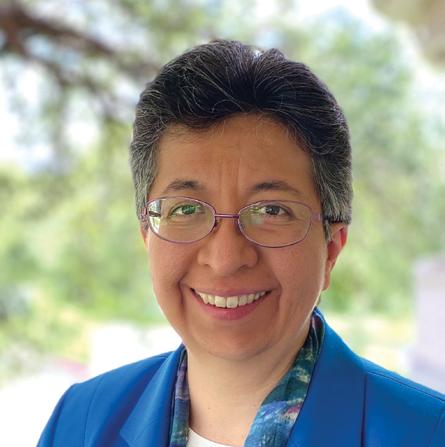
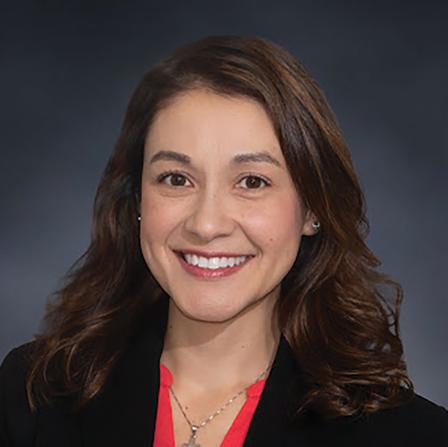
Sister Teresa Maya, CCVI, is a member of the Congregation of the Sisters of Charity of the Incarnate Word, San Antonio. In addition to her years of work in education, administration, and formation of Hispanic and Latino ministers, she served on the Leadership Conference of Women Religious (LCWR) presidency from 20162019.
British A. Robinson is a transformative, visionary leader and social entrepreneur with more than 20 years of experience spearheading initiatives in international and domestic health, corporate social responsibility, public-private partnerships, government relations, advocacy, and policy. She currently serves as President and CEO of the Barbara Bush Foundation for Family Literacy and previously served as Founding CEO of the Women’s Heart Alliance, as well as more than a decade in leadership roles with the U.S. Jesuit Conference.

20
20
The Future of Women’s Leadership in the Church
Pope Francis continues to prioritize women’s leadership. In 2022, he issued a new Vatican constitution that opens the door for women, as well as lay men, to serve in any top dicastery role, greatly increasing the opportunities for women to serve in leadership within the Church.
On a recent flight back from Bahrain, he made many direct and bold statements regarding women and equality with men, from remarking that a society that is not able to make room for women “does not move forward,” to saying that chauvinism “kills humanity” and that “a society that erases women from public life is a society that becomes impoverished.”
“Equal rights, yes, also equal opportunities, equality in moving forward,” Pope Francis said.
The growing opportunities for women to serve in leadership at the Vatican gives a sense of hope to many women doing work on the ground in the Church.

“It’s heartwarming and affirming to see the Pope supporting women in their desires to serve the Church in the broadest terms and fulfill their God-given call at every level of the Church,” Robinson said. “It sends a wonderful message that women — including lay women — are valued as much as men, and that they can play a key role in the work of the Church.”
“My hope is that what we’re starting to see at the Vatican level will continue to snowball into a more balanced and healthy composition that welcomes the gifts that are in our
Church that come to all, not just those with ordination,” Sr. Maya said.
When asked how the Church can better serve women who hold leadership roles, both Sr. Maya and Lamas agree that equipping young women with leadership opportunities and proper mentorship is key.
“Whether it’s in the Church or whatever your field, it is essential to have enough women there that went ahead of you for you to know, ‘Hey, it’s possible for me too’,” Sr. Maya said.
“In my own life, there were individuals who opened doors for me, creating leadership positions that I probably would have never had otherwise,” Lamas shared. “So for me, creating those opportunities for others is key, especially for women.”
21
8 General Secretariat of the Synod. 2022. “Enlarge the space of your tent (Is 54:2): Working Document for the Continental Stage.” Vatican Synod of Bishops. October 27, 2022. https://www.synod.va/content/dam/synod/common/phases/continental-stage/dcs/Documento-Tappa-Continentale-EN.pdf.
Milissa Else
It’s heartwarming and affirming to see the Pope supporting women in their desires to serve the Church in the broadest terms and fulfill their God-given call at every level of the Church.
–BRITISH ROBINSON
LATINO PASTORAL LEADERS INITIATIVE:
Forming the emerging Hispanic leadership of the Church
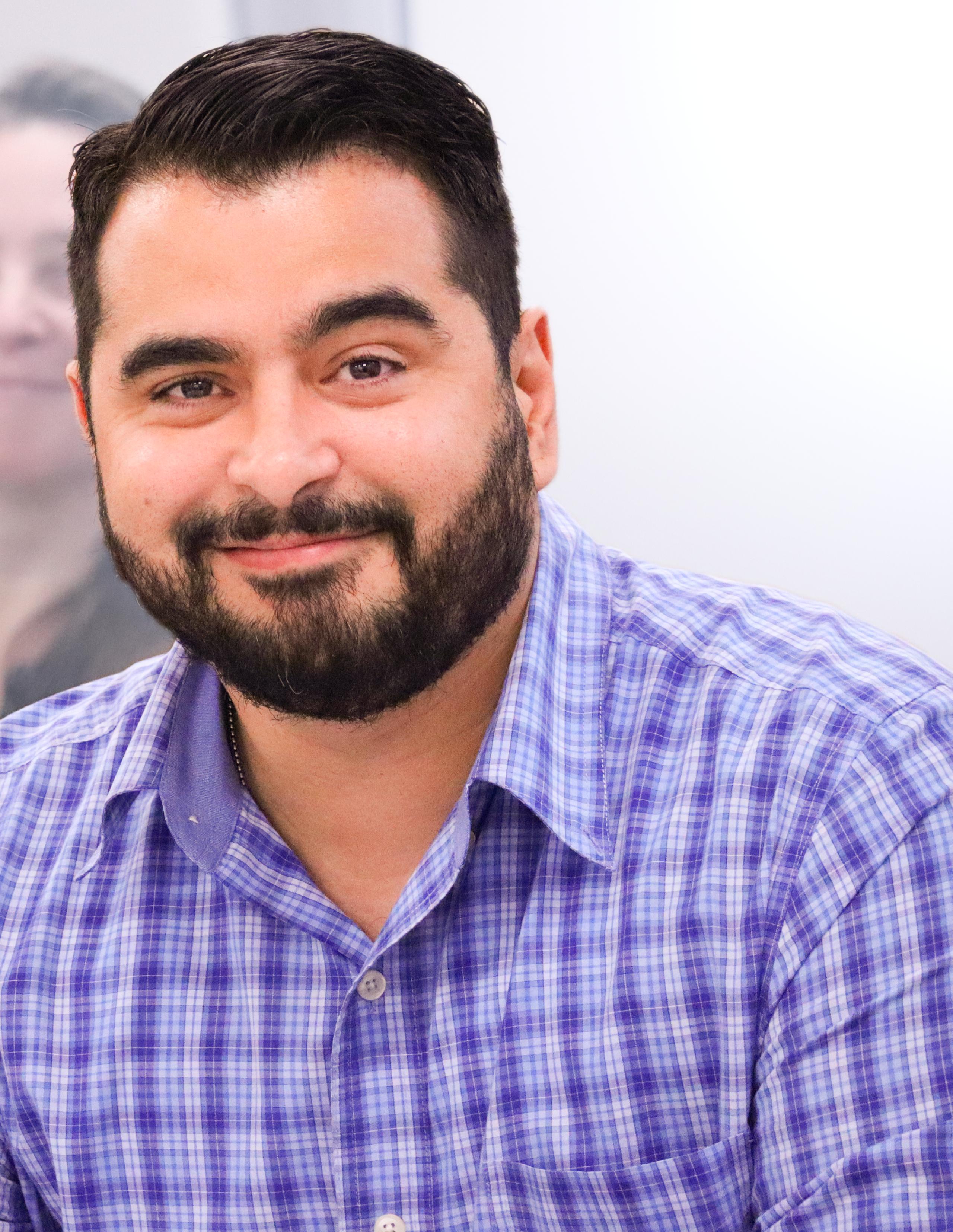
22
Daniel Cobreiro
“I learned that Church leaders of the future will be, increasingly, lay people and must have a heart for service. Without lacking humility, they must grow in confidence. This is especially true in the case of women,” said Marina Alonso de Gallo, a participant in the Diocese of St. Augustine.
Alonso de Gallo is one of more than 60 leaders who have taken part in the advanced leadership formation program known as the Latino Pastoral Leaders Initiative. Created in response to the growing needs of the Hispanic/Latino Catholic community raised during the V Encuentro process, the 12-month-long Latino Pastoral Leaders Initiative offers comprehensive formation and leadership development that meets the unique needs and challenges faced by Hispanic/Latino leaders in the Church.
Leadership Roundtable launched the Initiative in 2021 in the Diocese of Joliet in Illinois. The program expanded with a second cohort in the Diocese of St. Augustine, Fla. In 2022, we concluded our work with St. Augustine and both launched and concluded work with a third cohort in the Diocese of Austin, TX.
Throughout the comprehensive program, Hispanic/Latino parish and diocesan staff, volunteers, clergy, and religious women walked together to master the program’s elements. In a combination of large and small group settings, participants learned best practices in Church management, developed new relationships with their peers, created personal leadership development plans, and expanded their network within their diocese — all with the goal to grow the capacity of Hispanic/Latino ministers to lead in myriad Church settings.
“The best part of this entire initiative was how personal it all became. It started at first, at least in my mind, as something instructional — an opportunity to gain skills, to evaluate our abilities — but it really became something
personal,” Daniel Cobreiro, a participant in the Diocese of St. Augustine, shared. “This program has created a better leader and a better person in myself.”
The Growing Community of Hispanic/ Latino Catholics in the U.S. Church
The number of Hispanic/Latino Catholics continues to rise in the U.S. Catholic Church and research shows more Hispanic/Latinos are being formed as Church leaders.
PERCENTAGE OF U.S. CATHOLICS WHO ARE HISPANIC BY YEAR
HISPANIC LEADERSHIP IN THE CHURCH IN 2022
of lay leaders enrolled in Lay Ecclesial Ministry Formation Programs are Hispanic 40% 23% 22%
of U.S. diaconate formation programs offered in Spanish of seminarians scheduled for ordination in 2022 were Hispanic.
23
I learned that Church leaders of the future will be, increasingly, lay people and must have a heart for service. Without lacking humility, they must grow in confidence. This is especially true in the case of women.
–MARINA ALONSO DE GALLO
2007 2014 2020 29% 34% 42%
SOURCE: Data extrapolated from the Religious Landscape Study by Pew Research conducted in 2007 and 2014 and the 2020 Census of American Religion by the Public Religion Research Institute.
SOURCE: Fall 2022 report from The Center for Applied Research in the Apostolate at Georgetown University (CARA)
Among Hispanic/Latino Catholics, a 2022 book by the Center for Applied Research in the Apostolate at Georgetown University (CARA titled “Faith and Spiritual Life of Young Adult Catholics in the Rising Hispanic Church” found that domestic and popular religion is alive and well, notably that the experience of Hispanic/Latino Catholics is transforming leadership within the faith community to something that is lay-centered, inclusive, and culturally competent. The book concluded that the larger Church needs to encourage young adult leadership, especially among those in the Hispanic/Latino Catholic community.
“Lay faithful have active participation in the pastoral life and stewardship of the Church; thus, the formation of the agentes pastorales “[pastoral agents]” is a priority. We are blessed that Leadership Roundtable … has prioritized the Hispanic Ministry in designing this Initiative, recognizing that the future of the Catholic Church in the United States depends largely on the leadership of the Hispanic people,” said Bishop Emeritus Felipe J. Estévez of the Diocese of St. Augustine.
Recognizing the important role of young adult leaders in the Church and the Hispanic/Latino community, Leadership Roundtable actively included young adult participants in each cohort.
“We are called to be disciples, but we are also called to raise up other disciples and help them grow in leadership as well,” said Enrique Velasquez, a young adult leader who took part in the cohort in the Diocese of Austin.
“Seeing how to learn from other people is a big skill I’m taking away from this program and something that I am going to implement in my ministry at my parish.”
Elevating the Voices of Hispanic/Latino Leaders
Fr. Juan Molina, president and CEO of the Mexican American Catholic College, said that “for too long, the Church has not benefited from the leadership talents of Hispanics/Latinos. For the Church to continue to grow and evangelize, it is vital that our Church continues the work begun with the V Encuentro to form leaders from the Hispanic/Latino community and welcome them to the leadership tables.” Fr. Molina is also a member of the National Advisory Committee for the Initiative.
“In order to advance the mission of Christ in our local church, we must prepare future leaders by providing formational development,” said Bishop Joe S. Vásquez of the Diocese of Austin. “Opportunities to learn, engage, and dialogue with others enables us to form disciples for our Church. I am grateful to those who have responded to this call to serve.”
Leadership Roundtable took care to design the Latino Pastoral Leaders Initiative as a comprehensive formation program that provides Hispanic/Latino leaders access to critical leadership skills while also addressing the complex pastoral environments where these leaders serve.
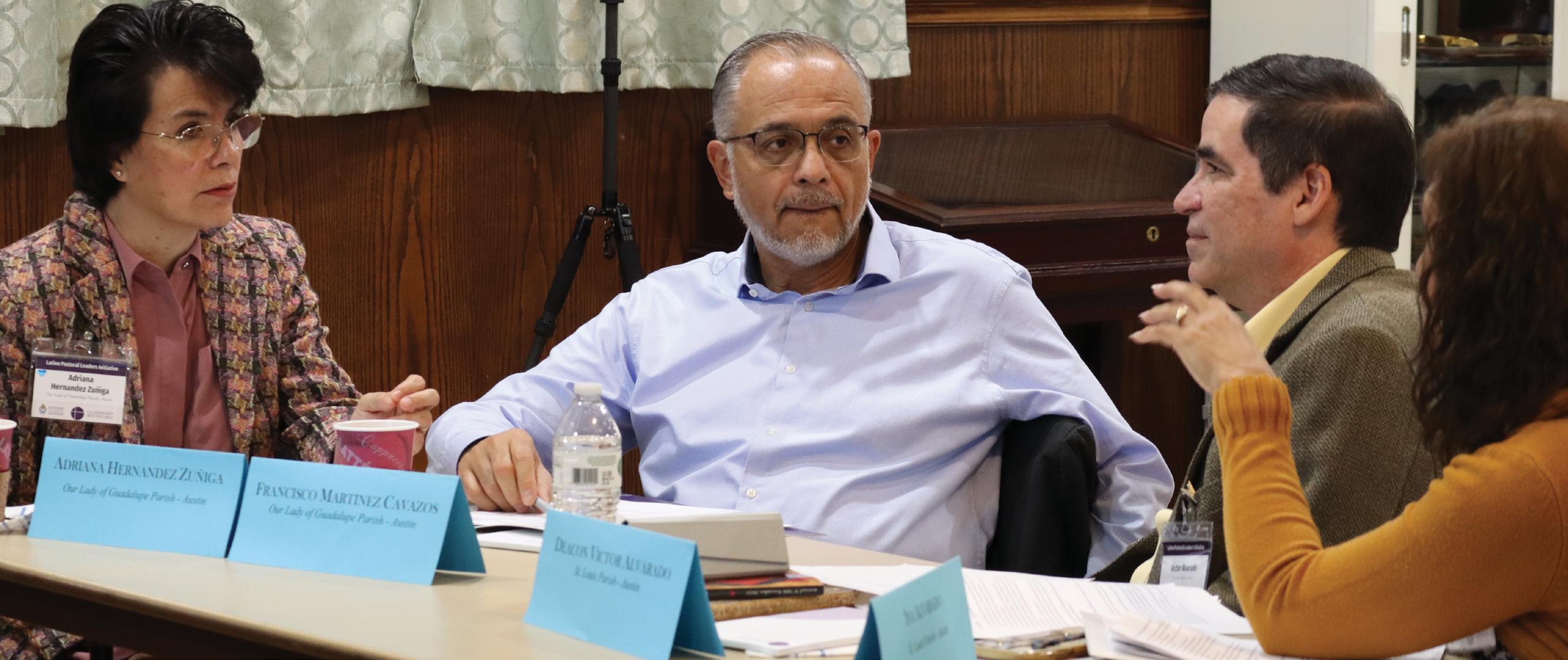
24
(left to right) Adriana Hernández Zúñiga, Francisco Hernandez Peraza, Deacon Victor Alvarado, and Inarhu Alvarado
“What I see with the work of Leadership Roundtable is that we try to bring a sense of hope and opportunity, even despite all of the Church’s challenges,” said Javier Bustamante, a former member of the National Advisory Committee and program facilitator in the Initiative. He also serves as Director of the Center for Cultural Engagement at The Catholic University of America.
“We have all these tools to make our Church responsive to the needs of our communities, to the needs of the faithful,” he continued. “That creates an opportunity and a sense of hope knowing that there are people working to make the Church more attentive and responsive.”
Ongoing Leadership Formation
The “National Synthesis of the People of God in the United States of America for the Diocesan Phase of the 2021-2023 Synod” published by the USCCB in 2022 identified “ongoing formation for mission” as one of the core themes that emerged from the U.S. Synod, where more than 700,000 Catholics took part. It also found welcoming and including those of diverse cultural backgrounds in the life and leadership of the Church as a central theme.
The formation of lay leaders in the Church is essential, said Bishop Vásquez.
“We have invested a great deal of energy, resources for priests, clergy, and deacons to be well prepared to serve the people of God, but we have not always done a great job in supporting our laity, and it’s so important to have well-formed leaders,” he said.
Leadership Roundtable’s investment in the Latino Pastoral Leaders Initiative and our other programs demonstrates our commitment to assisting pastoral leaders’ lifelong leadership formation needs, including serving Hispanic/Latino Catholics in the U.S. Church.
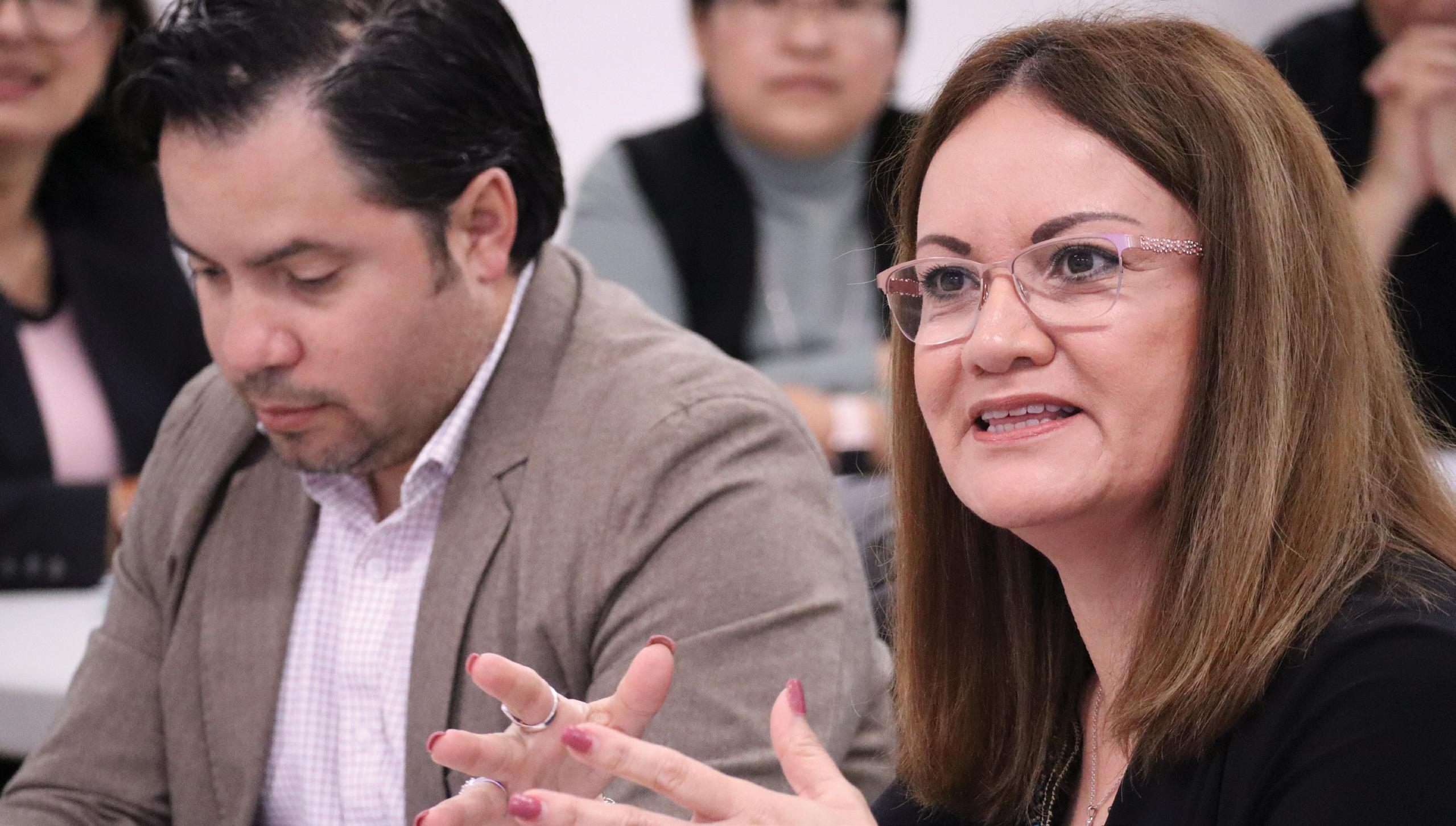
“Sometimes as lay people, we wonder where we have permission to serve, but a big grace from this program was that the Lord is always inviting us to lead and that he is inviting us to lead as lay people,” said Jocelyn Perez, a participant in the Diocese of Austin and young adult campus minister serving the University of Texas-Austin University Catholic Center.
The Initiative not only benefits participants in their ministerial roles, but beyond, in their communities and professional lives.
25
Larry Rodriguez (left) and Norma Vélez de Garcia (right)
Judy Morales-Steinheimer, a participant in the Diocese of Austin, is also a City Councilmember for the City of Temple, TX. Through the Initiative, she realized that, as a leader, there is more she can do and greater impact and involvement she wants to have both in the Church and her community. The formation she received helped her to overcome fears and hesitations as a leader, and she is now working to help identify and form youth leaders at her parish and leads prayer at City Council meetings.
“Being part of the Latino Pastoral Leaders Initiative has encouraged me to continue to do outreach in my community, knowing that the Holy Spirit will guide me and protect all our works,” she said.
Core Elements of the Latino Pastoral Leaders Initiative
In developing the Latino Pastoral Leaders Initiative, Leadership Roundtable worked to ensure that all program elements were culturally adapted, creating materials in both English and Spanish, and that respond to the many complexities Hispanic/Latino pastoral leaders face in dayto-day ministry. Participants engaged in the program both online and in–person and were welcomed to participate in the language in which they were most comfortable.
Feedback Results
100% of participants in the Diocese of St. Augustine responded “absolutely” or “very much so” when asked whether the Initiative gave them confidence to seek out future ministry leadership roles
Attending the trainings, workshops, and small group discussions in this way allowed greater flexibility for the leaders, many who were not full-time employees of the Church.
“It is a person-based training that involves so many skills and technical training,” explained Miguel Galeano, a participant in the Diocese of St. Augustine. “The small groups allowed us to develop confidence, share our challenges, and support each other … We felt that we were not alone and that we are one Church, which makes us more proactive within our ministries.”
Learning From What Works
At the conclusion of each program, Leadership Roundtable asks participants to complete a program evaluation. Across the board, the program has produced strong responses from participants who agree that among other benefits, the program gave them the confidence to both seek out future leadership and negotiate challenges, as well as increased their effectiveness in meeting leadership goals.
In addition to evaluation at the conclusion of the program, Leadership Roundtable sought to understand the sustained impact of the Initiative. We engaged an
100% of participants in the Diocese of Austin responded “absolutely” or “very much so” when asked if the Initiative increased their effectiveness in meeting their ministry leadership goals
100% of participants in the Diocese of Joliet responded “absolutely” or “very much so” when asked if the Initiative increased their confidence to negotiate challenges in their ministry
26
independent evaluator to conduct an impact assessment study six months after the conclusion of each cohort.
In the Diocese of Joliet, the 6-month follow-up assessment found that “considering the Latino Pastoral Leaders Initiative is a prototype, with no precedent as a program, its reception and impacts are exceptionally impressive. The content is strong and especially appreciated by lay leaders, both volunteer and professional. Participant satisfaction is very high, and the program shows very positive outcomes in terms of individual leaders’ learning, behavior, and results.”
In the Diocese of St. Augustine, analysts found that “the Latino Pastoral Leaders Initiative has become an even stronger program after its successful start, with stellar results across many categories and improving outcomes in those areas previously identified as needing attention.”
One measure of participant satisfaction in the assessment is the Net Promoter Score (NPS). NPS quantifies the likelihood of a person recommending an organization or service to a friend or colleague, and as such, is a good
proxy for enthusiasm.
In the Diocese of Joliet, participants rated the Latino Pastoral Leaders Initiative with an NPS of 67 out of 100. In the Diocese of St. Augustine, participants gave it an NPS of 86 out of 100. By contrast, the average American business elicits an NPS of 10, with high-performing businesses producing an NPS of 50-80. Average NPS scores for nonprofits vary by sector, but generally tend to be higher overall than that of for-profit companies.
“If you have the opportunity to participate, you should do so, as it makes you see yourself differently, that there is more potential than you think you have,” said Williams Toledo, a participant in the Diocese of St. Augustine.
“The program impacts the Church positively by empowering its leaders and training them to be more effective in their role. More people should participate to strengthen their leadership skills and be more effective and inspire more potential leaders,” said Luz Guerrero, a participant in the Diocese of St. Augustine.
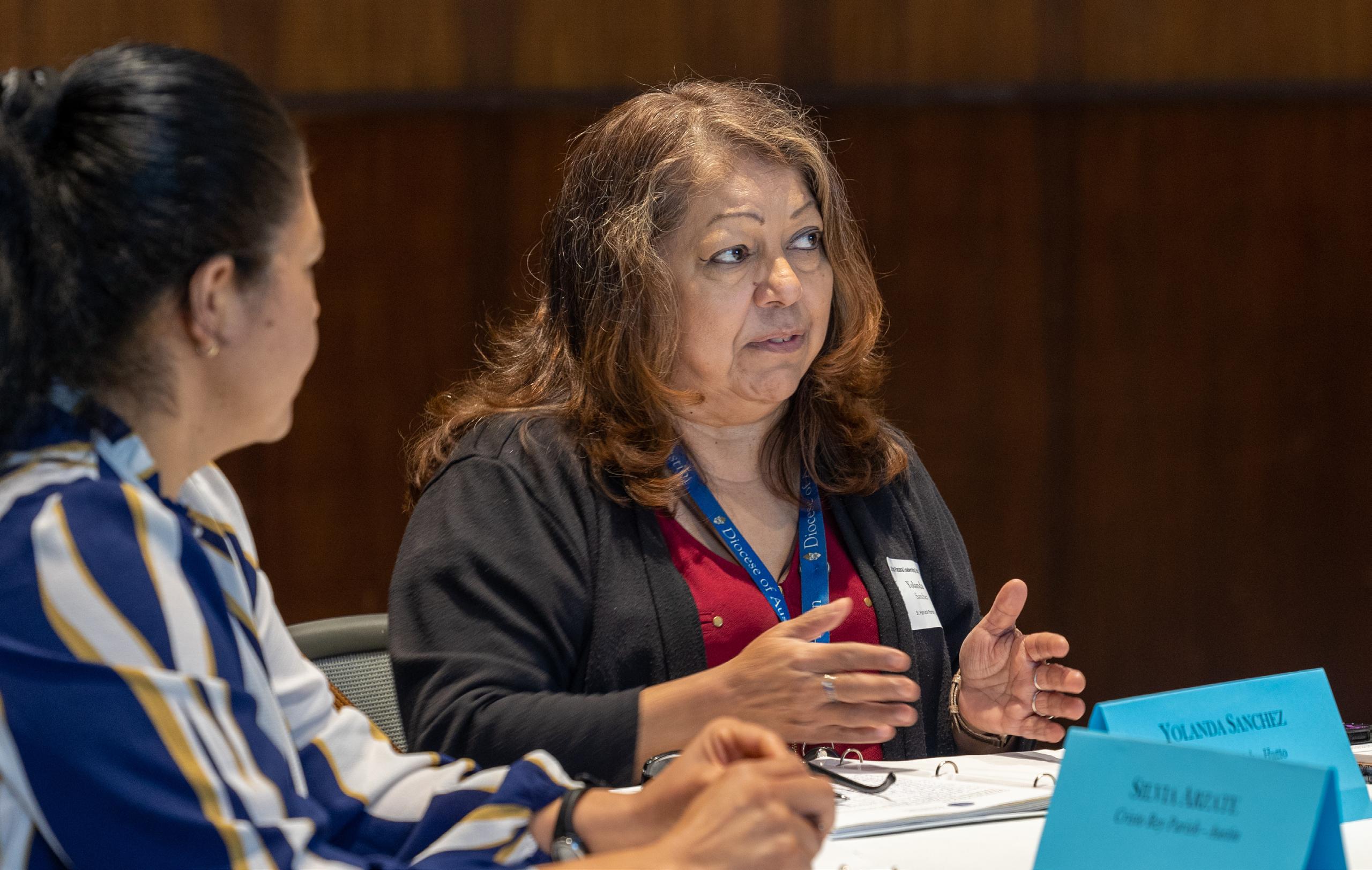
27
Silvia Arzate-Gomez (left) and Yolanda Sanchez (right)
CATHOLIC LEADERSHIP 360: THE POWER OF FEEDBACK
For more than a decade, Catholic Leadership 360 has been a core piece of Leadership Roundtable’s service to the Catholic Church.
Created to help strengthen individual leadership, the program provides pastoral leaders with feedback and development tools to help them personally grow in the core leadership competencies needed as a pastoral leader.
As part of our ongoing commitment to promote co-responsible leadership culture in the Church, in 2022 we expanded our delivery of Catholic Leadership 360, offering the program fully online to leaders from anywhere in the country and increasing delivery to dioceses.
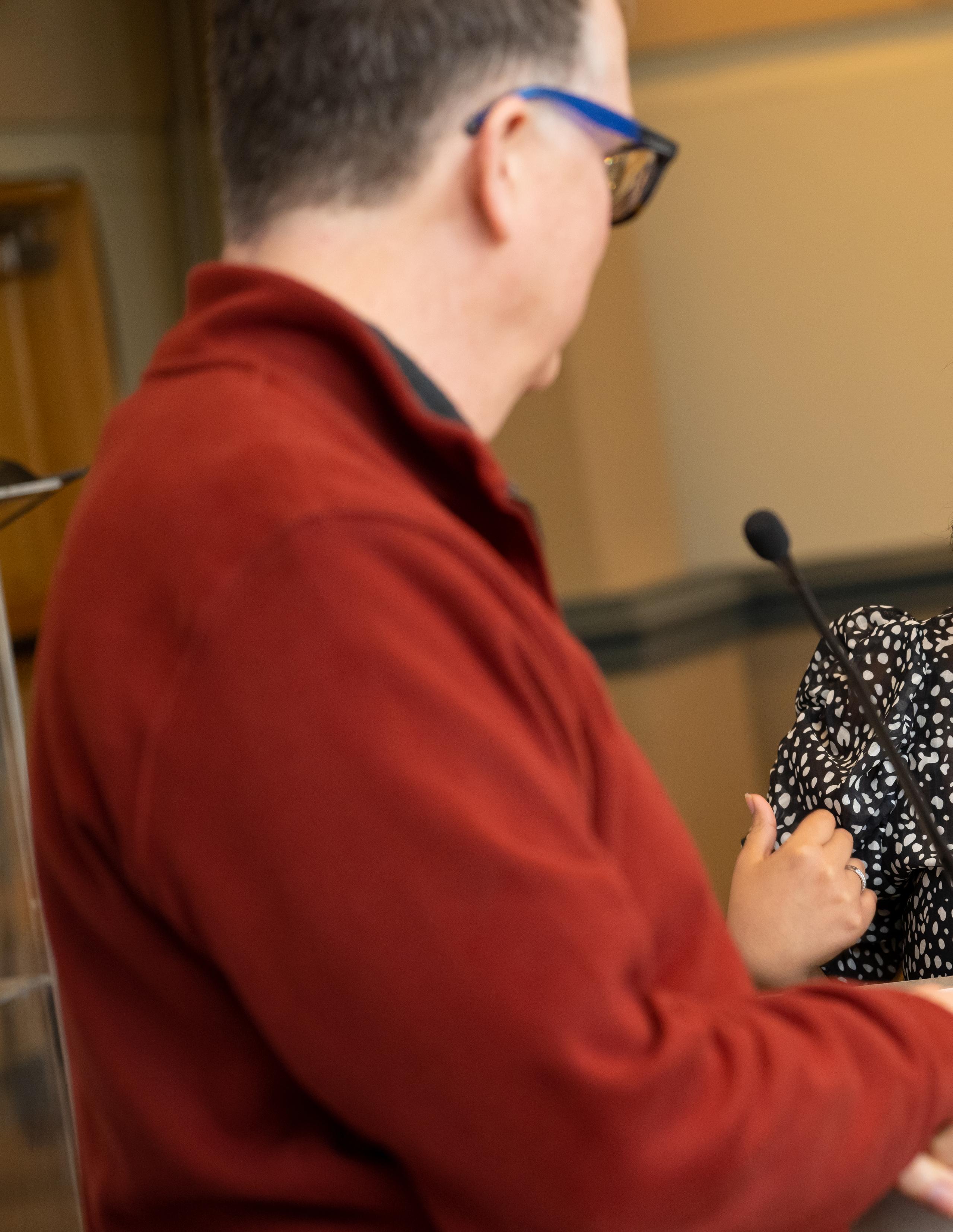 28 Fatima Arroya (right) with Fr. Kevin Kennedy (left)
28 Fatima Arroya (right) with Fr. Kevin Kennedy (left)
Creating Catholic Leadership 360
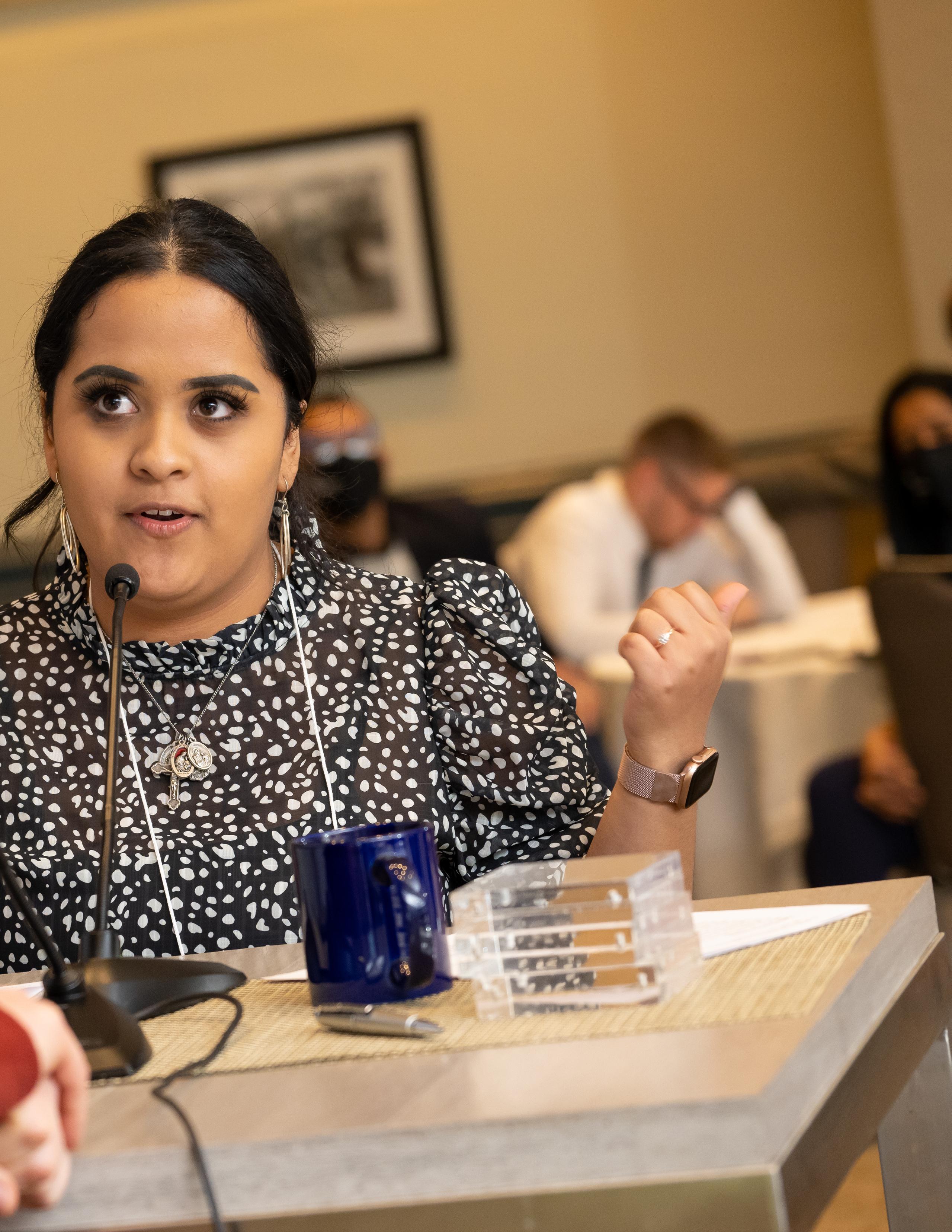
Early in Leadership Roundtable’s history, Catholic leaders identified the need for priests and pastoral leaders to receive focused and supportive feedback. Unable to identify an existing program that met our needs, we designed a customized assessment tool and process. The program both promotes leadership development within the specific vocational and pastoral context of the Church and incorporates 360-degree feedback, a method proven to promote leadership development in sectors outside of the Church.
In partnership with the National Federation of Priests Councils (NFPC) and the National Association of Church Personnel Administrators (NACPA), we launched Catholic Leadership 360 in 2008, offering participants comprehensive feedback on their leadership competencies, a personal leadership development plan, and, for those who wanted more support, peer group coaching to facilitate their continued growth as a pastoral leader.
Catholic Leadership 360 was a wonderful experience. It helped me look at all aspects of my role as a Catholic Leader.
29
–DANIEL SALVATORE
To date, more than 1,000 Church leaders — including lay leaders, cardinals, bishops, priests, and women religious — have completed Catholic Leadership 360.
Reaching more leaders online
What makes Catholic Leadership 360 unique is that it provides leaders with not just a comprehensive feedback report, but also guides them in the creation of a personalized development plan based on self-identified needs. For those individuals and dioceses who opt to also receive peer group coaching as part of Catholic Leadership 360, the coaching provides additional support to help participants achieve their leadership development goals. Over time, the specifics of the delivery and the support we provide for participants has evolved, including an online development planning tool that maps and tracks a participant’s progress.
Leadership Roundtable continues to scale our impact in the Church, including expanding access to Catholic Leadership 360 through bilingual, online, and hybrid cohorts. We offered the program to significantly more participants and effected greater transformation in leadership development in the Church.
The global COVID-19 pandemic showed the world the power of online learning and the doors it could open. Seeking an avenue to reach leaders who would not otherwise be able to take part in a Catholic Leadership 360 delivery, we piloted a fully online version in 2021.
Daniel J. Salvatore, principal at St. James Regional Catholic School in Ridley Park, Pa., was one of the first
Bilingual Cohort
Jan. 11: Orientation Workshop
Feb. 15: Feedback Workshop
Mar. 1: Development Workshop
Spring Cohort
Mar. 15: Orientation Workshop
Apr. 19: Feedback Workshop
May 3: Development Workshop
leaders trained on our online Catholic Leadership 360 program, participating in our pilot national online cohort.
“Catholic Leadership 360 was a wonderful experience. It helped me look at all aspects of my role as a Catholic leader,” Salvatore said. “A key component was looking at building and maintaining relationships. The Catholic Leadership 360 program taught me that leadership means knowing yourself and your limitations as well as knowing the people and personalities you work with. It helped me to develop great school relationships, learn to let others know what my limits are, and when to say no when the limit has been reached. Catholic Leadership 360 is dedicated to forming good life-long Catholic leaders.”
Due to the pilot’s positive reception, we committed to hosting three online Catholic Leadership 360 cohorts in 2022 that welcomed any pastoral leader in the United States.
In total, 20 participants from across the United States took part, each receiving constructive feedback and creating leadership goals resulting from this feedback.
While the content of the online Catholic Leadership 360 is the same as what we offer to dioceses and other organizations, the online format makes the experience more accessible to a broader group of pastoral leaders who can log-in from their place of ministry or their own home, eliminating valuable time commuting for other ministerial or personal activities.
Our online delivery will continue in 2023, expanding further to include a cohort specifically for bilingual Hispanic/Latino leaders.
Summer Cohort
May 10: Orientation Workshop
June 14: Feedback Workshop
June 28: Development Workshop
Fall Cohort
Sept. 6: Orientation Workshop
Oct. 11: Feedback Workshop
Oct. 25: Development Workshop
All Workshops Held from 3 - 5 p.m. ET 2–4 pm CT 1–2 pm MT 12 NOON–1pm PT
30
2023 COHORTS
Catholic Leadership 360 across the United States in 2022
Expanding Catholic Leadership 360 into more Dioceses
While receiving feedback from peers can be intimidating, participants in Catholic Leadership 360 have repeatedly expressed that the program is transformative and that they walk away from the experience feeling affirmed and loved by those whom they serve.
In 2022, a total of 128 participants participated in a total of ten Catholic Leadership 360 cohorts given by Leadership Roundtable, an increase of 4 additional cohorts and 33 percent more participants from 2021.
Seven of these cohorts were offered on a diocesan level, serving participants from 15 different dioceses, parishes, and organizations. We offered Catholic Leadership 360 cohorts in the dioceses of:
• Chicago (2 cohorts in 2022)
• Milwaukee
• Newark
• Austin
• Evansville
• Owensboro
Participants in Catholic Leadership 360 this year hailed from: dioceses of Chicago, Milwaukee, Newark, Austin, Evansville, Owensboro, Cheyenne, Philadelphia, and Pittsburgh. Additional participants took part from Sacred Heart Seminary and School of Theology in Hales Corner, Wis. and St. Vincent Seminary in Pennsylvania, Our Lady of the Miraculous Medal Parish in Hampton, N.H. and Our Lady of Perpetual Help Parish in Salem, Va., as well as two Catholic organizations: Catholic Climate Covenant and KNOM Radio Mission in Nome, Alaska.
Preparing to Scale
Catholic Leadership 360 has transformed the lives and ministries of more than a thousand pastoral leaders. If fully scaled, it has the potential for transformation of the Church writ large. In the coming year, we plan to expand the program further by partnering with universities and other Catholic organizations to deliver the program. We are currently in conversation with potential partners that provide leadership development and would have the capacity to offer and lead Catholic Leadership 360 through their communities.
Several diocesan cohorts also welcomed participants from other dioceses.
31
Dots represent the dioceses, parishes, seminaries, and organizations from which participants in Catholic Leadership 360 hailed in 2022.
Supporting Diocesan Finance Council Members
As members of the Coalition for Ethical Financial Management in the Church met throughout 2021 and 2022 and discussed what could be done to enhance transparency, trust, and accountability of Church finances, it became clear that there was a need and opportunity for a nation-wide community for those serving on diocesan finance councils.
Formed in March 2021 by 25 leaders in Catholic finance who gathered to address co-responsibility and ethical financial management in the Church, the Coalition for Ethical Financial Management in the Church includes leaders from across the U.S., and seeks to advance excellence in fiscal stewardship. It operates through three working groups — Research and Benchmarks, Best Practices, and Diocesan Finance Councils — each meeting regularly to develop recommendations that promote, facilitate, and support ethical financial management.
A Need for Community
Many Coalition members noted in early meetings the importance of the peer network and opportunities for professional development that diocesan finance staff have through the Diocesan Fiscal Management Conference (DFMC). Recognizing a similar need for support and community among those who serve on diocesan finance councils, the Coalition formed a working group to explore a way to create such a space. In mid-2022, the Coalition facilitated the first meeting of the Diocesan Finance Council Chair Network, a networking community for those who serve on diocesan finance councils.
“The Network is seen as a way to help close a gap in opportunities for diocesan finance council chairs and members to network with each other,” shared Russ Elmayan,
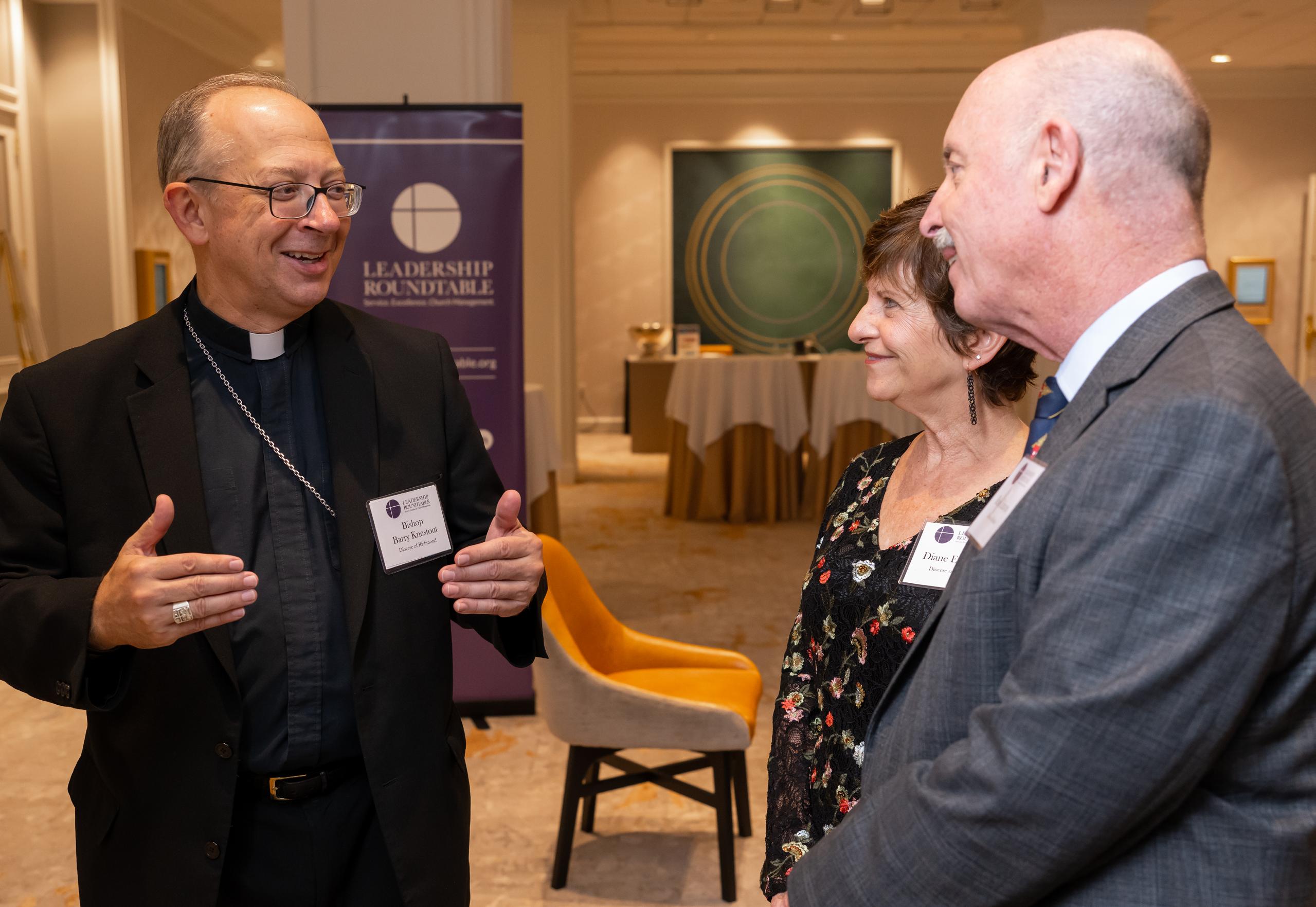 Chief Financial
Chief Financial
Officer (CFO) and Chief
Administrative
Officer (CAO) in the Diocese of
32
Bishop Barry Knestout of the Diocese of Richmond (left) and Diane and Russ Elmayan (right).
Raleigh and co-facilitator of the Network. Leadership Roundtable Executive Partner, Kerry Robinson, also serves as a co-chair.
“As a Diocesan CFO, I have a ready-made network of peers whom I can consult, as dioceses are typically dealing with similar challenges, so I do not have to reinvent the wheel in addressing issues in my own diocese,” he continued. “Diocesan Finance Council Chairs do not have that same kind of network, and our sense was that such a network would help Diocesan Finance Councils see beyond just how things are done in their own dioceses, and it would create a venue to ask questions and share best practices, so that they are not addressing important issues in isolation.”
Meeting bi-monthly, the Network comes together to discuss issues requested by the members that would pertain to any finance council chair or member. These meetings create an opportunity for members to share their ideas, experiences, and successes surrounding best practices and solutions to the issues that U.S. dioceses are facing regarding finances.
Currently, there are 56 members of the Network representing 35 dioceses. The Network continues to expand and extends an invitation not just to finance council chairs but any diocesan finance council members.
Are you a diocesan finance council chair or member? Consider joining the Finance Council Network. To learn more and find out if the Network is right for you, contact Russ Elmayan: Russ.Elmayan@raldioc.org To get on the invitation list for future meetings, contact Anna Aeloiza: anna.aeloiza@raldioc.org JOIN THE NETWORK
The Network is seen as a way to help close a gap in opportunities for diocesan finance council chairs and members to network with each other.
33
–RUSS ELMAYAN
Without management transparency, and coordination and collaboration, it is difficult to see a future for the Catholic faith.
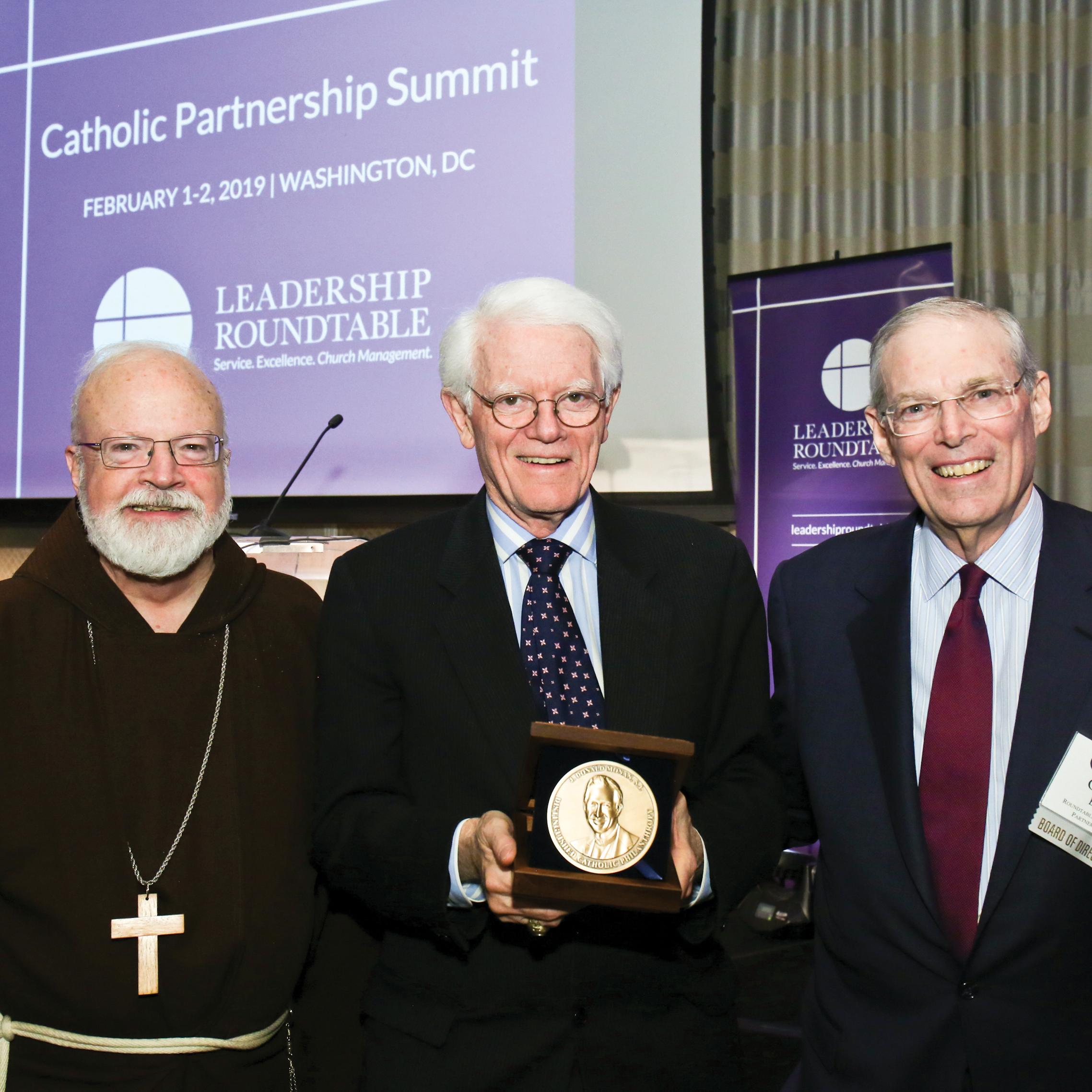
34
(left to right): Cardinal Seán O’Malley, OFM Cap., Peter Lynch, Geoff Boisi
“ ”
–PETER LYNCH
DONOR SPOTLIGHT:
THE LYNCH FOUNDATION
Investing in innovation and meaningful change
For more than 32 years, The Lynch Foundation has been supporting innovative nonprofits working to create meaningful change in their communities. Since 2013, it has been a supporter of Leadership Roundtable and our mission.
Founded by Peter Lynch and his late wife Carolyn in 1988, the foundation sought to provide life-changing opportunities to people through the support of nonprofit organizations driving meaningful change.
“A core value I’ve held all my life is that to whom much is given, much is expected. I’ve worked to uphold that at The Lynch Foundation so it informs everything we do,” Peter Lynch said referencing the verse in Luke chapter 12.
Devout Catholics, who were awarded the Papal Order of Saint Gregory 1999 — the highest honor bestowed by the Vatican on lay Catholics — the Lynches operated the foundation from their Catholic values and continue to support many Catholic causes, particularly education.
To date, The Lynch Foundation has issued more than $155 million in grants, including grants to Leadership Roundtable in support of our mission.
Much of The Lynch Foundation’s philanthropic support has centered in Boston, the foundation’s home, according to Executive Director Katie Everett. Leadership Roundtable’s work to promote best practices of transparency, accountability, and co-responsibility in addressing the abuse crisis in the Church connected with the foundation’s work in Boston, where the abuse
crisis first came to light in 2002 with the “Spotlight” investigation.
The foundation felt Leadership Roundtable played a significant role in the transparency that has been implemented since 2002 in the Church — changes Everett said were experienced in Boston with the appointment of Cardinal Seán O’Malley, OFM Cap. as Archbishop.
Leadership Roundtable is also on the forefront of the work to highlight the contributions of lay leaders to the Church and to bring more laity into leadership roles.
“That is going to lead to a stronger, more effective, higher functioning Church,” she said.
“It’s really smart to engage laity, religious orders, and all different stakeholders for the future of our Catholic Church,” Peter Lynch said. “There is no other entity bringing together such a wide variety of stakeholders in such a collaborative, effective and thoughtful manner like Leadership Roundtable.”
Absent the work of Leadership Roundtable, it would be very difficult for The Lynch Foundation to make other investments in the Church or its dioceses, said Everett.
“We can’t effectively work within any program areas in the Catholic Church without addressing the management and governance structures of the Church,” she said.
“The unique and much-needed mission of Leadership Roundtable is one of the main reasons we invest in the organization.”
35
THE POWER OF DISCERNMENT: A YOUNG ADULT’S STORY OF FORMATION
For young adult Catholics like Zachary Conti, the strength of their faith life and their active involvement in the Church is a direct result of taking part in the young adult formation program ESTEEM (Engaging Students to Enliven the Eccesial Mission).
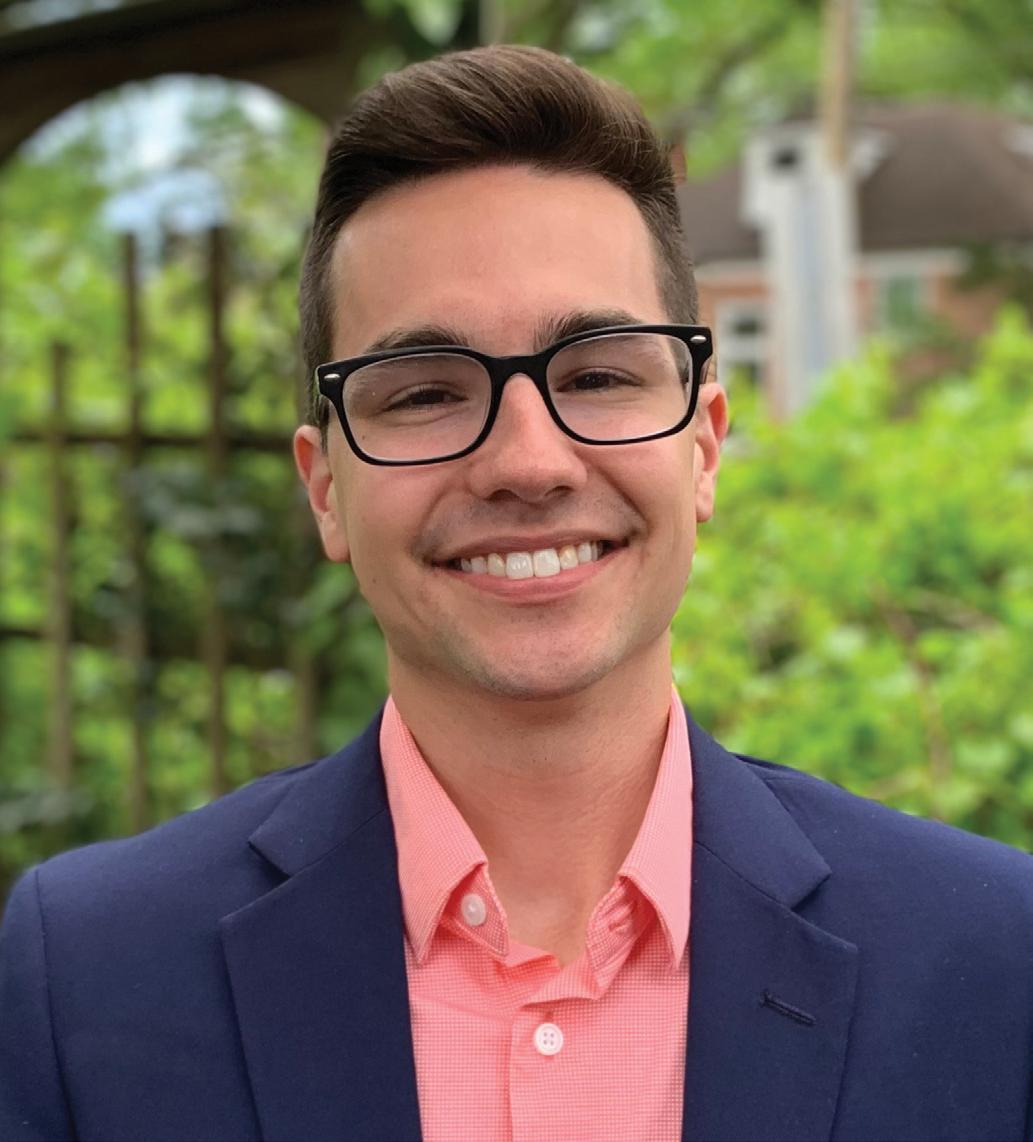
Zachary (Zach) Conti attended The Ohio State University and got involved with ESTEEM in 2016 at the Newman Center at Ohio State.
“The ESTEEM program connected me with other students who cared deeply about serving the Church and provided formation retreats, discussions, and resources,” he said.
Formed in Faith
ESTEEM began more than 10 years ago as a partnership between Leadership Roundtable and Saint Thomas More Catholic Chapel and Center at Yale University, offering mentorship, leadership development, and connection to the faith for young adult Catholics.
As Conti observed at Ohio State, universities often offer a lot of inward-focused faith opportunities for students, like Bible studies and men and women’s events, but few have opportunities for students to actually put our faith into action and to implement Pope Francis’ vision of servant leadership.
ESTEEM forms young adults not just as leaders but as leaders who have a life-long engagement in their faith and who work to stem the tide of exodus from the Church. It has formed hundreds of young adult leaders like Conti at colleges and universities across the United States in their baptismal call to use their gifts and talents in service to the Church and reconnected many to their faith.
The formation and empowerment Conti personally got
out of his ESTEEM experience, as well as the peers he met, motivated him to begin to build a ministry focused on Catholic Social Teaching on campus, one that allowed Catholic students to live out their faith through actions.
The mentorship and peer connections provided through ESTEEM inspired him and some fellow students to establish a student chapter of Catholic Relief Services (CRS) on Ohio State’s campus.
Through the chapter, they amplified the voices of families displaced by the Syrian Refugee Crisis, hosted a letterwriting campaign to senators urging immigration reform based on Catholic Social Teaching principles, and led a candlelight vigil through campus in solidarity with refugees at the end of the Easter Vigil Mass.
“I really felt the Spirit there,” Conti said of the vigil. “I see
36
Zachary Conti
ESTEEM as planting the seeds for all of that to happen, because that doesn’t happen unless a whole group of people work to implement something.”
Faith Beyond the Campus
A core element of ESTEEM is how it prepares students to avoid the typical post-college “spiritual drop off” that can occur when a student leaves a vibrant faith community, like a Newman Center, filled with friends who share their faith and values and with spiritual growth opportunities available constantly. For Conti, it was important to maintain after graduating the two pillars of his faith: community and individual prayer.
Conti had prayerfully discerned a calling to pursue work directly impacting human dignity, and upon graduation in 2018, he set out to pursue a career in public service or advocacy.
He moved to Washington, D.C. and during the next five years, he worked in different settings, including U.S. Congress, federal agencies, and nonprofits, continuously discerning if his work setting was right for him.
For Conti, the pillars of community and prayer are vital to living out the Catholic faith, especially as a young adult working outside the Church. He advises all young adults to stay true to the Gospel through these two pillars.
“Always be on the lookout for the opportunity to connect with God in our prayer, in our work, and in every person we encounter — and be creative about it,” he said. “If we’re listening to the voice of God, we will find those opportunities.”
Like many ESTEEM alumni, the program was a critical part of Conti’s formation, giving him the tools and the community to experience what missionary discipleship could look like, even in a secular environment.
“There are ways to be the presence of the Lord in our different types of workplaces,” he said. “So it was just a matter of finding the environment where that call of service and discipleship meshed with my talents and desires.”
As he progressed in his career, Conti said he tried to remind himself to routinely pause and reflect on the work he was doing and ask if it felt in line with his vocation and how he felt through ESTEEM, a time when he felt he was really living out the Gospel.
“ESTEEM’s emphasis on reflection and development helped me identify my talents, so that when I found my current workplace, I recognized it for the wonderful opportunity that it was,” he said. “ESTEEM prepared me not only for the hard work of finding work that aligned with my vocation, but also gave me the disposition to know what I had when I found it.”
Today, Conti is working as an analyst in the U.S. Government Accountability Office, a congressional agency that conducts performance audits of federal programs, and said he feels he has found where he is meant to be.
He is also active in parish life. Having visited different parishes before finding the right fit, he is now involved in the young adult and parish formation and programming at his parish.
Our Current ESTEEM SITES:
ESTEEM is a joint partnership between Leadership Roundtable and Saint Thomas More Catholic Chapel and Center at Yale University that supports, encourages, and affirms the leadership of young adults in the Catholic Church and assists in their transition into parish life through education, community, faith formation, and mentorship.
Learn more at https://esteemlead.org
University of the Bahamas
California University of Pennsylvania
Drexel University
University of Northern Colorado
Ohio State University
University of Pennsylvania
Purdue University
Saint Thomas University
Vassar College
Washington and Jefferson College
Waynesburg University
Williams College
Yale University
37
About ESTEEM 37
J. Donald Monan, SJ
Distinguished Catholic Philanthropy Medal
About the Monan Medal
Leadership Roundtable is honored to present the J. Donald Monan, SJ Distinguished Catholic Philanthropy Medal. The Monan Medal seeks to inspire a culture of giving that promotes excellence in Church management and leadership. We look to recognize outstanding Catholic philanthropists who exemplify the legacy of the former president of Boston College, Fr. J. Donald Monan, SJ. Fr. Monan’s life was a living testimony to how best practices, implemented in collaboration between clergy and laity, can transform a Catholic institution to bring excellence to management and mission.
The J. Donald Monan, SJ Distinguished Catholic Philanthropy Medal recipients are Catholic philanthropists who have collaborated with Church leaders to make a significant impact on a parish, diocese, or other Catholic ministry in the area of Church management or leadership.
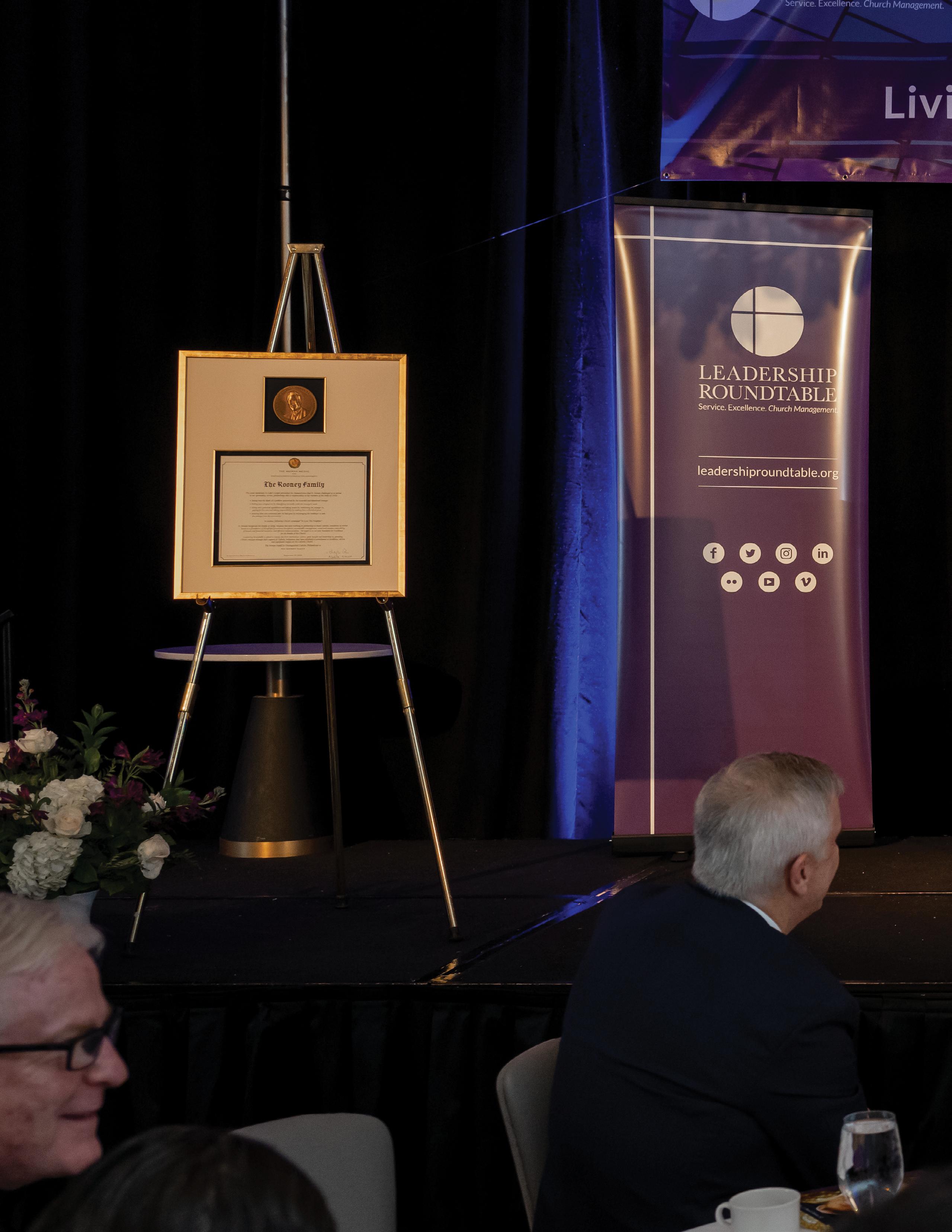
38
2022
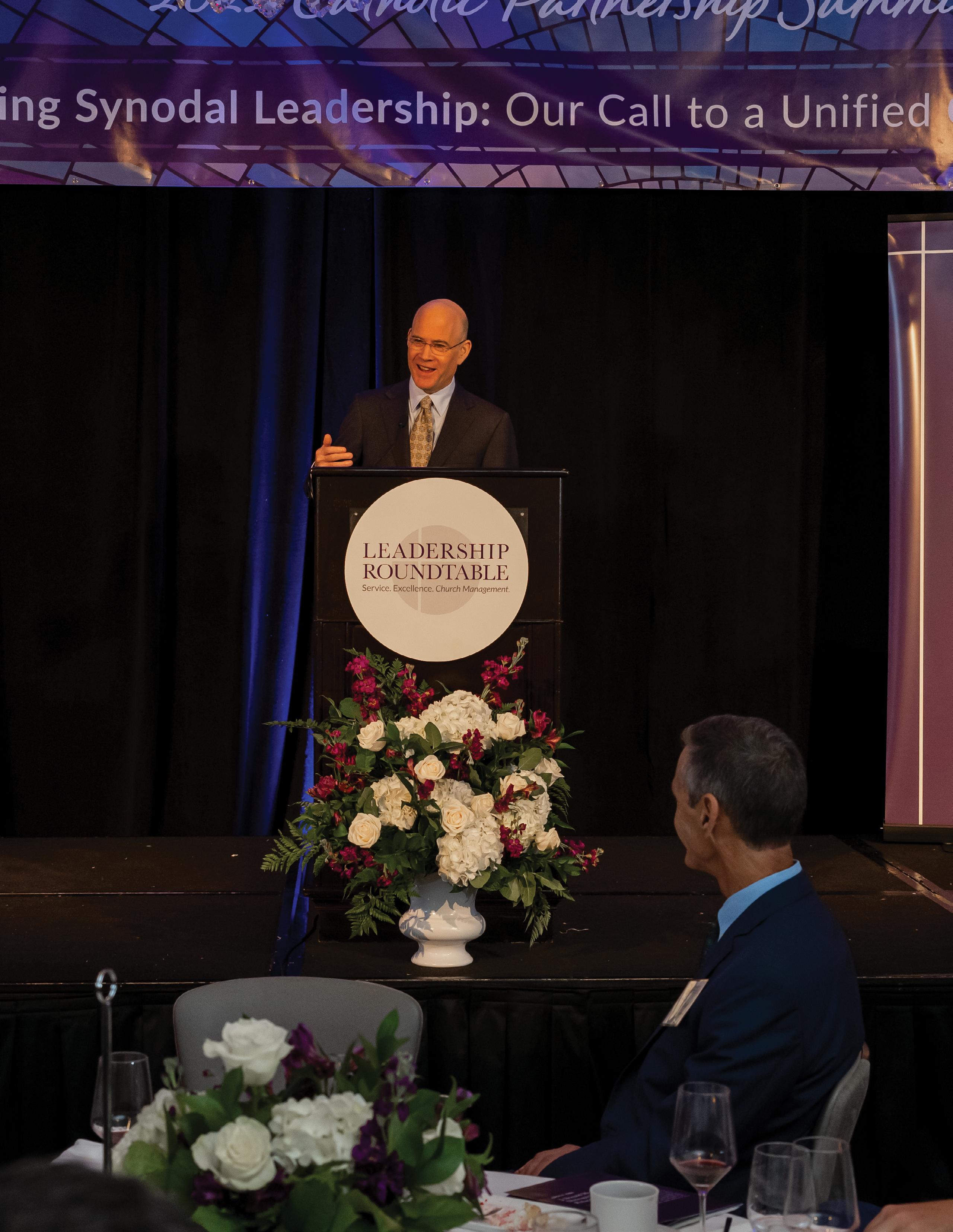
39
Jim Rooney accepts the 2022 J. Donald Monan, SJ Distinguished Catholic Philanthropy Medal on behalf of his family on Sept. 22, 2022 at the Fairmont Hotel in Washington, D.C.
The Rooney Family — owners of the Pittsburgh Steelers — and Elaine and Ken Langone — Ken, the co-founder of The Home Depot — were honored on Sept. 22 during the 2022 Catholic Partnership Summit for their generous giving to the Catholic Church and to Catholic charitable causes.
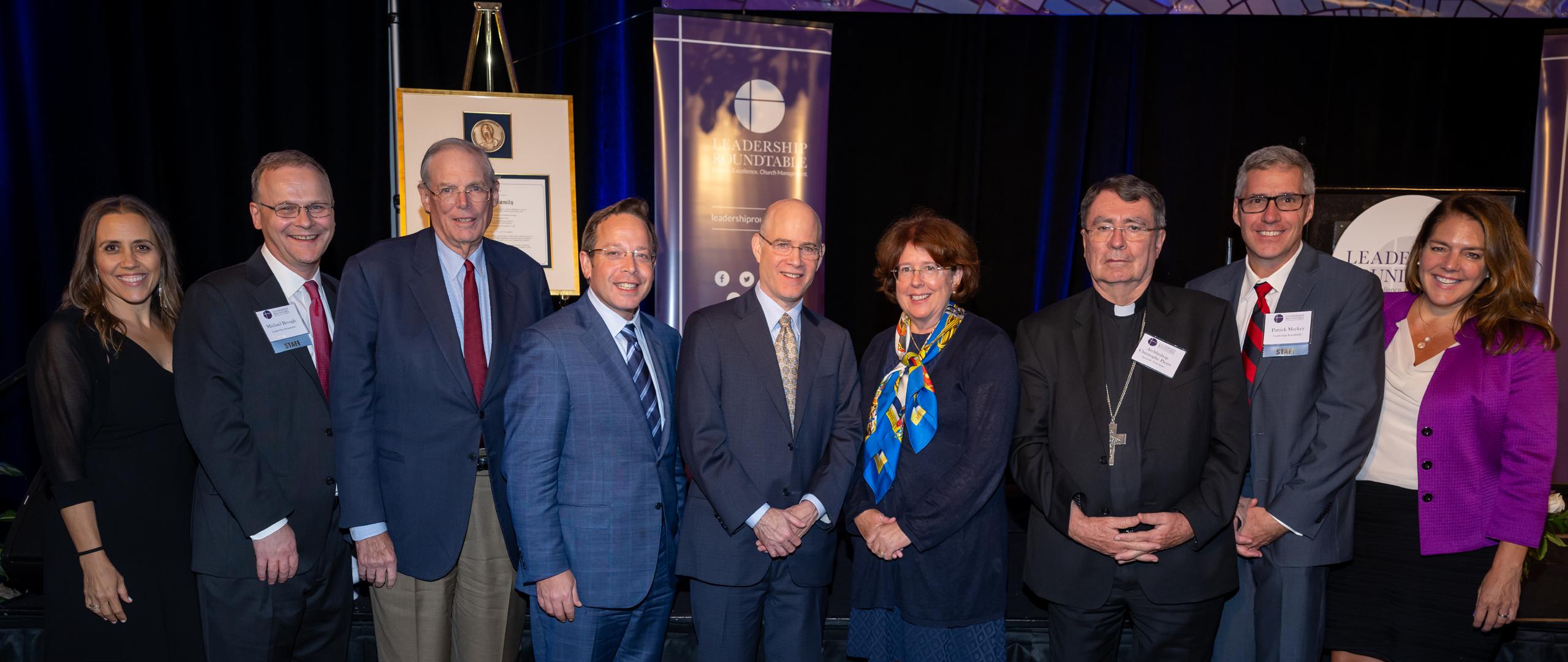
The Rooney Family and Mrs. and Mr. Langone received the J. Donald Monan, SJ Distinguished Catholic Philanthropy Medal (“Monan Medal”), an award conferred annually to Catholic philanthropists who have invested generously and faithfully in the work to promote excellence in Church management and leadership, and whose giving reflects Fr. Monan’s deeply held belief in collaborative excellence and partnership.
“The Rooneys and the Langones exemplify the strong commitment to faith and the generosity of both resources and spirit that was the hallmark of Fr. Monan’s life,” said Geoffrey T. Boisi, founder of Leadership Roundtable.
Established by Leadership Roundtable, the Monan Medal seeks to thank and inspire philanthropists of the Catholic faith who emulate and personify the vision, character, creativity, and commitment to excellence of the late Fr. Monan, a member of the Society of Jesus. Fr. Monan was the longest-serving president of Boston College and he dedicated his life to spreading Christ’s mission through the inclusive partnership of ordained, religious, and lay
Catholic leaders.
Both families received the Monan Medal at a special gala event on Sept. 22, 2022 in Washington, D.C., where the Apostolic Nuncio to the United States, Archbishop Christophe Pierre, offered a blessing. The families were nominated to receive the medal by a committee of Catholic leaders that included Fr. Monan’s cousin and trustee of Boston College, Cynthia Lee Egan; Georgetown University President John “Jack” DeGioia; Association of Jesuit Colleges and Universities President Rev. Michael J. Garanzini, SJ; Children’s Scholarship Fund President Darla Romfo; Rose Mary Donahue, Assistant to the President at Boston College; and Rev. J. Bryan Hehir, Secretary for Health and Social Services, Archdiocese of Boston and Montgomery Professor of the Practice of Religion in Public Life, Harvard Kennedy School (Retired).
“I had the privilege of studying under Fr. Monan when I attended Boston College and to receive this honor, named in his legacy, in recognition of my family’s commitment to and support of our Catholic faith is humbling,” said Jim Rooney, who accepted the medal on behalf of his family.
“Faith, family, and football are strong values among my family, and none more important to us than our Catholic faith. It has been the catalyst for much of what we have been blessed to accomplish — from my father’s creation of the Rooney Rule to bring equity to leadership in
40
(left to right): Executive Partners Kim Smolik and Michael Brough; Founder Geoff Boisi; Board Co-Chair Geno Fernandez, Jim Rooney (2022 Monan Medal Honoree), Board Co-Chair Elizabeth McCaul, Archbishop Christophe Pierre, and Executive Partners Patrick Markey, and Kerry Robinson.
football, to our continued support of Catholic education and social services in Pittsburgh,” he said.
“When many of us in Pittsburgh think about the Rooney family, our minds go back to Art Rooney, Sr., fondly referred to as ‘The Chief,’ and his guidance of the Steelers football team,” said The Most Rev. David A. Zubik, bishop of the Diocese of Pittsburgh. “Through getting to know The Chief personally, I quickly became aware that, even with all his fame and financial success, his heart was always focused on his wife, his family, and the Catholic Church. Art Rooney, Sr. forged a path of servant leadership through his ongoing service to the Church and those in need. He invited the rest of his family to follow that same path.”
Art Rooney, Sr. founded the Steelers in 1933. His brother, a Benedictine monk known as Fr. Silas, served as Chaplain under Patton in World War II and taught renowned scholar Thomas Merton. For generations, the Rooney family has continued to support Catholic charities, institutions, and education.
Elaine and Ken Langone were among the original 40 signatories of The Giving Pledge, a promise by the world’s wealthiest individuals and families to dedicate the majority of their wealth to charitable causes. Elaine and Ken Langone signed the pledge noting in their commitment that “it is inspiring how such a simple idea puts faith into action for the community as a whole.”
Speaking about his generous support of St. Patrick’s Cathedral in New York City, Ken Langone said: “My activities here as a trustee of St. Patrick’s Cathedral, and my involvement in the restoration of St. Patrick’s Cathedral was a very precious part of my feeling that I was doing what I can to help people live a better, more spiritual life.”
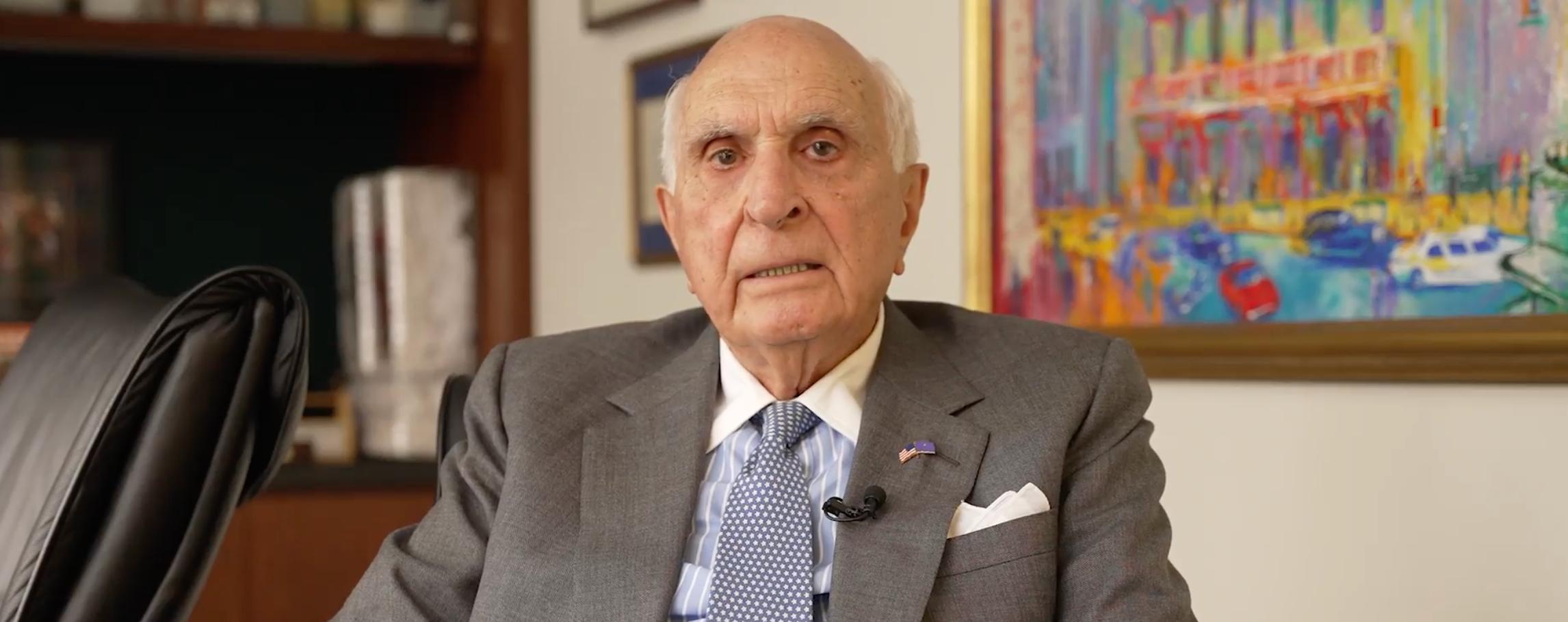
In addition to their support of St. Patrick’s Cathedral, the Langones have also been long-time supporters of Catholic education, including Partnership Schools and the Inner City Schools Foundation. Ken was made a Knight of St. Gregory by Pope Benedict XVI — an honor bestowed upon Catholic men and women in recognition of their personal service to the Holy See and to the Catholic Church, through their unusual labors, their support of the Holy See, and the examples they set in their communities and their countries.
“I think that those of us who have been blessed with experience in business have a very strong obligation to do what we can to help the spiritual leaders in our faith do as much as they can with whatever resources they’re given,” Ken said. “I really feel that is a strong moral obligation on all of our parts.”
Leadership Roundtable hosted the Monan Medal ceremony in conjunction with its Catholic Partnership Summit, a gathering of more than 230 leaders from across the U.S. on the theme of Living Synodal Leadership: Our Call to a Unified Church.
41
Ken Langone, 2022 Monan Medal Honoree
When James P. Rooney left Newry in County Down, Ireland in 1845, he took his rosaries and little else. After two generations of the family seeking a new life, Arthur J. Rooney, Sr. was born in Pittsburgh. He grew up on Pittsburgh’s northside with the help of the Sisters of Charity. Art Sr. developed athletic skills in Catholic institutions, including Duquesne University’s Prep school. He starred in baseball and the relatively new sport of football. He went on to accept a baseball scholarship at Georgetown University. He would also become a Golden Gloves Boxer, boxing at events throughout the Northeast, often sponsored by, or supporting, Catholic Charities.
Art eventually decided to become a promoter, starting a professional football team, the Pittsburgh Steelers, in the fledgling NFL in 1933. Through this work, he continued his dedication to Catholic Charities, which would later name their largest annual fundraising event in his honor, the Art Rooney Awards Dinner. He became especially committed to the orphanage known as the Holy Family, now the Holy Family Institute of Pittsburgh.
Art’s brother became a Benedictine monk known as Silas. Father Silas would serve as a chaplain under Patton in the Pacific Theater during World War II. Fr. Silas would come home to become a professor at St. Bonaventure College in New York. Fr. Silas taught the renowned Catholic scholar Thomas Merton while at St. Bonaventure.
Art passed his love of the Church to all five of his boys. They each attended St. Peter’s grade school and North Catholic high school in Pittsburgh. Each one has become a significant supporter of Catholic education and Catholic charity efforts throughout communities in Pittsburgh, New York, and South Florida.
Dan, Art Sr.’s oldest son, would not only follow Art’s footsteps as the president of the Pittsburgh Steelers, but,
2022 HONOREE THE ROONEY FAMILY
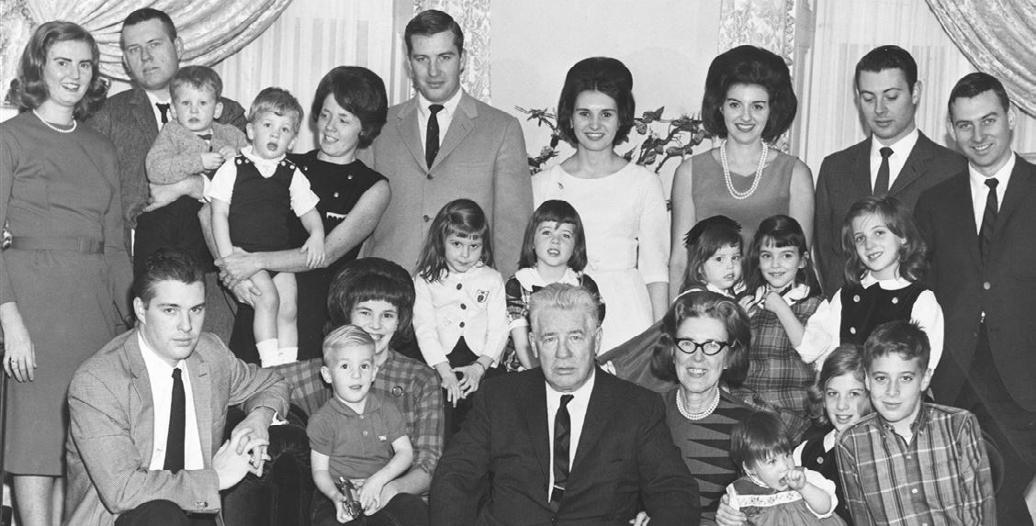
with the same commitment to Catholic education, would send his nine children to schools run by the Sisters of St. Joseph, the Brothers of the Holy Cross, and the Jesuits. Dan also institutionalized the work that his father had done with Holy Family, building strong ties between Holy Family, Catholic Charities of Pittsburgh, and the United Way, which Dan chaired for many years. The Rooney Foundation was founded in 1996 by Dan Rooney.
Beyond his philanthropic work, Dan is credited with spearheading the workplace diversity requirement, in which NFL teams must interview minority candidates. This policy has become known as the “Rooney Rule.”
Dan has talked of how he was inspired to lead this effort in bringing greater equity to American business through the sermons of Father Mark Glascow, regarding the role of Catholic faith in the Civil Rights movements of the 1960’s. Outside of football, Dan Rooney served as the United States Ambassador to Ireland. He was also co-founder of The Ireland Funds, which raises funds for the support of peace and reconciliation, community development, education, and arts and culture in Ireland. The current Steelers’ president, Dan’s son, Art II, attended St. Cyrils grade school and the Holy Cross Brothers Gilmore Academy in Ohio. He now runs the team, while his wife Greta leads the efforts with Holy Family Institute. Art II has continued the involvement in Catholic philanthropy through his work with the family foundation.
Dan’s youngest son, Jim, attended Boston College and was able to learn many important lessons under the leadership of Father J. Donald Monan SJ. All three of Jim’s children, Sarah, Jimmy, and Matthew, attended Georgetown University and have continued the family’s commitment to social justice and serving the poor.
42
The Rooney Family
2022 HONOREE ELAINE AND KEN LANGONE
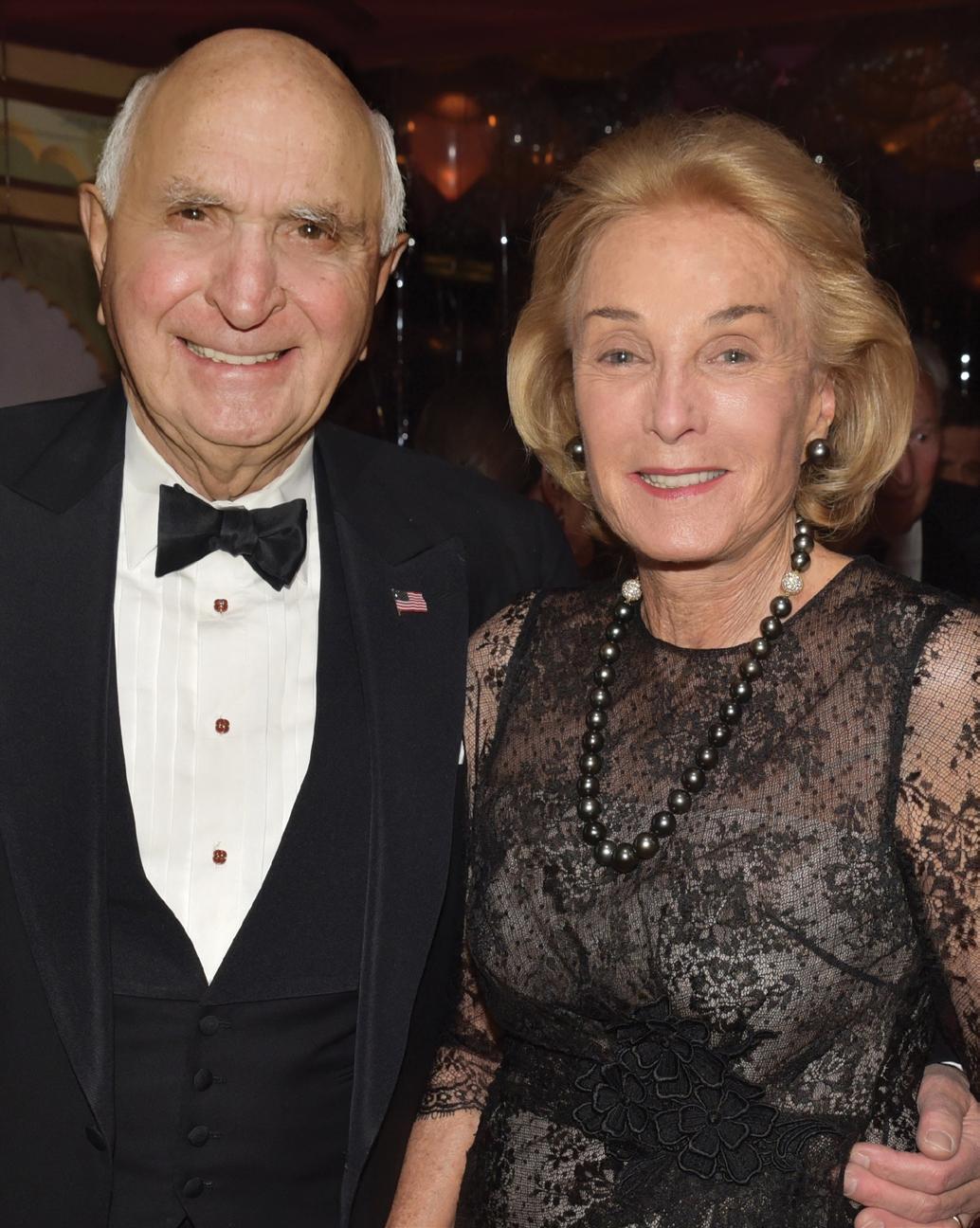
Ken Langone is an American businessman, investor, and philanthropist, best known for co-founding The Home Depot. Ken was born in Roslyn Heights, NY to Italian-American working-class parents. He graduated from Bucknell University with a Bachelors of Arts in Economics and Political Science.
After graduating, Ken found work in the investment department of Equitable Life Assurance Company, where he worked full time while attending night classes at New York University (NYU) School of Business. He obtained his MBA from NYU in 1960. Ken went on to name the evening program the Langone Part-time Program as a reflection of his gratitude for the education he received. Faith has always been a cornerstone of Ken’s life. He is on the board of St. Patrick’s Cathedral and is a dedicated supporter of both the Partnership Schools and the Inner City Schools Foundation.
He was made a Knight of St. Gregory by Pope Benedict XVI — an honor bestowed upon Catholic men and women in recognition of their personal service to the Holy See and to the Catholic Church, through their unusual labors, their support of the Holy See, and the examples they set in their communities and their countries.
Ken and his wife Elaine are well known for their philanthropy and were among the original signatories of the Giving Pledge, a movement of philanthropists who commit to give the majority of their wealth to charitable causes, either during their lifetimes or in their wills. Though they are very involved with, and are generous to,
Catholic causes, the Langones are also renowned for their immense generosity to health care, education, children and youth services, and more throughout the New York metropolitan area and beyond. They are most notable for their support of NYU Langone Medical Center (namesake), NYU Medical School, The Animal Medical Center, Bucknell, The Boys’ Club of New York, and Harlem Children’s Zone.
They are both active board members of a variety of organizations and offer both time and monetary resources. Past and present organizations include: Bucknell University, NYU Langone Health, Harlem Children’s Zone, the Robin Hood Foundation, the Center for Strategic and International Studies, St. Patrick’s Cathedral, and more. Ken and Elaine have three sons and reside in Sands Points, NY and spend their winters in North Palm Beach, FL.
43
Ken and Elaine Langone
Partners in Mission
Organizations
Archdiocese of Louisville
Anonymous
Association of US Catholic Priests
Boisi Family Foundation
CAPTRUST Advisors
Catholic Extension
Catholic Health Association
CCS Fundraising
Changing Our World, Inc.
Diocese of Fort Worth
Elizabeth & Frank Ingrassia Foundation
Gallagher | Global Religious Practice
Healey Family Foundation
Heffernan Family Foundation
Loyola University Chicago
Mary J. Donnelly Foundation
ParishSOFT
Penates Foundation
Raskob Foundation for Catholic Activities, Inc.
Reliable Automatic Sprinkler Co.
Sacred Heart Seminary and School of Theology
Seton Hall University
St. Rita Mercy Foundation
The Alphadyne Foundation
The Catholic University of America
The Hank Center for the Catholic Intellectual Heritage
The Lynch Foundation
The Pontifical Mission Societies in the U.S.
Werwaiss Family Charitable Trust
William E. Simon Foundation, Inc.
Individuals
Rev. John P. Beal, III
Frank Bisignano
Donald Boehm
Stephanie and Michael Brough
Michael Burnett
Anita Cain
Rev. Joseph Callahan
Patrick Carney, Sr.
Kevin Carton
Dee and Kevin J. Conway
Robert Crisci
Louise and Kenneth Cron
Dr. Barbara Cusack
Debra and Claudio Del Vecchio
Janet and Frank Dellafera
Kathleen and Dan J. Denihan
Rev. Monsignor Joseph T. Donnelly
Lt. Gen. (Ret.) James M. Dubik and Sharon Basso
Sue and Kevin Dwyer
Margi English
Deb and Jim Estes
Dr. Geno M. Fernandez
Joseph Finn
Dr. Zenobia V. Fox
Mario Gabelli and Regina Pitaro
Robert Gasser
Anne Gavin
Dr. Alice B. Hayes
Paul Henderson
Tim Hunt
44
Rev. John E. Hurley, CSP
Maureen and Dr. John J. Hurley
Susan and Mike King
Elaine and Ken Langone
Pamela and Dennis Lucey
Lt. Gen. (Ret.) Lawson Magruder
The Markey Family
Dr. Kathleen L. McChesney
Richard McGinnis
Peggy and Gene McQuade
Kevin Meme
The Honorable Michael Montelongo
Angela and Edward Murphy
Marie and Paul Napoli
Kate and Robert Niehaus
Thomas A. Nowak
Dr. George O’Connell
Jim and Molly Perry
R. Robert Popeo
Mary A. and S. Lawrence Prendergast
Joseph Regan
Paul Reilly
Dr. Brian B. Reynolds
Rev. Michael G. Roach
Ann and Peter Ann Robinson
Kerry A. Robinson and Dr. Michael Cappello
British Robinson
Rev. David F. Ryan
Dr. R. Gregory Sachs
David Savage
Brian Shea
Nicole Sotelo
Peggy and Dr. Peter Steinfels
Dominic Tarantino
Rev. Donald Thimm
Sue and Don C. Watters
Rev. Robert Wolfee
Tribute Gifts
Mr. and Mrs. Leon Cooperman
In Honor of Elaine and Ken Langone
Mr. and Mrs. Robert Gartland
In Honor of Elaine and Ken Langone
Mr. John Westerman
In Honor of Elaine and Ken Langone
Ms. Kendra E. Davenport, CFRE
In Memory of Maryalice M. Ennis
Rev. Anthony Pogorelc
In Memory of Rev. Robert Beloin
The above foundations, organizations, and individuals made generous gifts between January 1, 2022 and December 31, 2022.
If we neglected to accurately recognize your generosity, please accept our apologies and notify us so that we may correct our records.
45
SOURCES OF SUPPORT
$599,187 (19%)
$349,150 (12%)
USES OF SUPPORT
$287,795 (10%)
$2,527,430 (81%)
$2,250,548 (78%)
Philanthropic Support Program Revenue Programs Fundraising
46
Management
Financials
Leadership Roundtable has total net assets of $1.807 million that consist of:
Assets without Donor Restrictions $ 466,608
Assets with Donor Restrictions $ 1,340,416 Total Net Assets $ 1,807,024
Assets without Donor Restrictions are used to account for public support that is unrestricted in nature. Assets with Donor Restrictions are used to account for contributions that have donor-imposed restrictions that have not been fulfilled either in time or by purpose.
This summary was prepared by Leadership Roundtable from its financial statements, which were prepared by Matthews, Carter & Boyce. The complete financial statements, including the related notes and auditor’s report, are available on our website, leadershiproundtable.org, and upon request. 2022 audited financial states are in preparation and will be issued after this report. Once issued they can be found on our website at leadershiproundtable.org.
47
Philanthropic Support and Revenue Fiscal Year 2021 Fiscal Year 2020 Philanthropic Support Without Donor Restrictions With Donor Restrictions Total Without Donor Restrictions With Donor Restrictions Total Contributions Individuals $721,331 $80,299 $801,630 $467,704 - $467,704 Foundations $505,500 $1,220,300 $1,725,800 $803,100 $243,200 $1,046,300 Other Organizations - - - $3,250 - $3,250 Net Assets released from restriction Satisfaction of program restrictions $826,563) $826,563 $1,213,243 ($1,213,243)Total philanthropic support $1,226,831 $474,036 $1,700,867 $2,487,297 ($970,043) $1,517,254 Revenue Program Service Revenue $596,369 - $596,369 $752,813 - $752,813 Publication Sales $1,534 - $1,534 $2,607 - $2,607 Other Income $1,284 - $1,284 $3,550 - $3,550 Total Revenue $599,187 - $599,187 $758,970 - $758,970 Total Philanthropic Support and Revenue $1,826,018 $474,036 $2,300,054 $3,246,267 ($970,043) $2,276,224 Expenses Fiscal Year 2021 Fiscal Year 2020 Without Donor Restrictions With Donor Restrictions Total % of total expenses Without Donor Restrictions With Donor Restrictions Total % of total expenses Program Services Program Services $2,250,548 - $2,250,548 78% $1,927,369 - $1,927,369 75% Total Program Services $2,250,548 - $2,250,548 78% $1,927,369 - $2,250,548 75% Supporting Services Management and General $287,795 - $287,795 10% $216,691 - $216,691 8% Fundraising Expenses $349,150 - $349,150 12% $440,321 $440,321 17% Total Supporting Services $636,945 - $636,945 22% $657,012 - $657,012 25% Total Expenses $2,887,493 - $2,887,493 100% $2,584,381 - $2,584,381 100% Change in Net Assets ($234,912) $474,036 $239,124 $661,886 ($970,043) ($308,157) Net Assets at Beginning of Year $701,520 $866,380 $1,567,900 $39,634 $1,836,423 $1,876,057 Net Assets at End of Year $466,608 $1,340,416 $1,807,024 $701,520 $866,380 $1,567,900
Our Organization
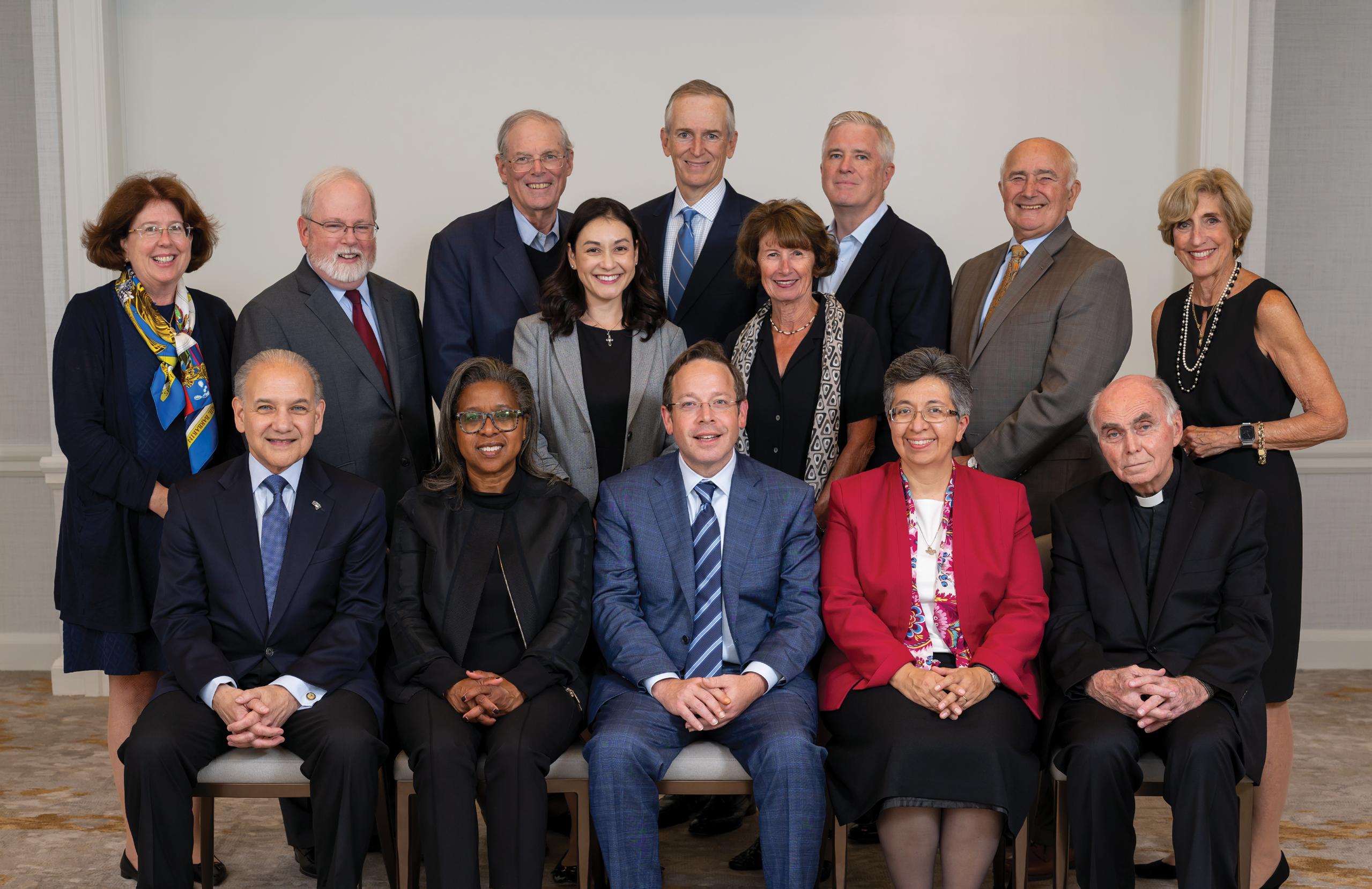
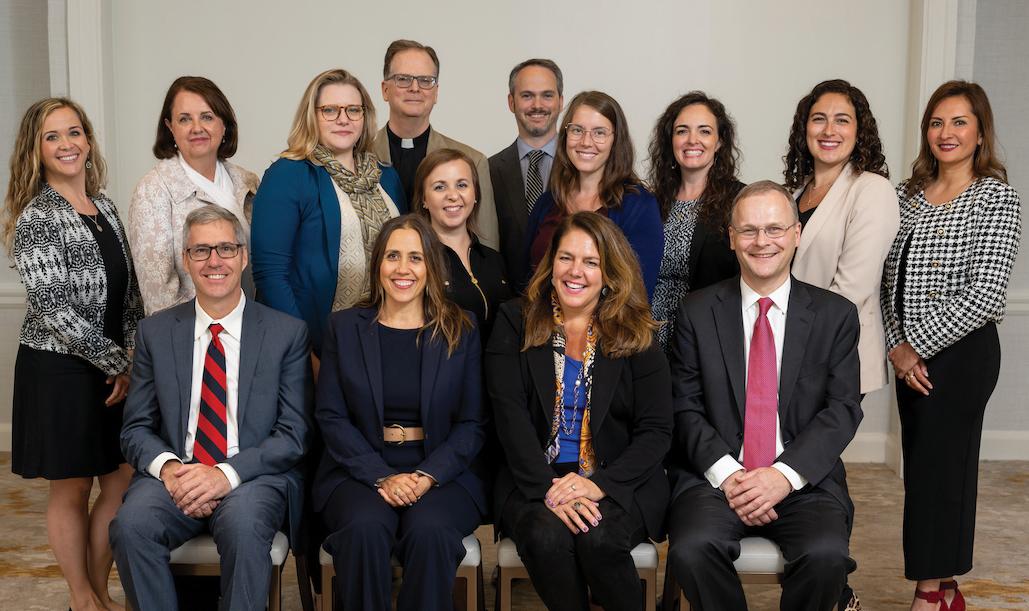
48
Leadership Roundtable Staff
Leadership Roundtable Board of Directors
Board of Directors
EXECUTIVE COMMITTEE
Staff
EXECUTIVE PARTNERS
Kevin K. Carton
Denihan Kevin
Rev.
Bryan F.
Susan
Gene McQuade
Montelongo
Perry
Donald Regan
C.
Brian B. Reynolds
John J. Wall
Robinson Christina Lamas
Chair
Founder,
Managing
McChesney Secretary of
Treasurer
DIRECTORS Rev. John Beal
Kendra E. Davenport Daniel
J. Dwyer
Michael J. Garanzini, SJ
Grane Thomas J. Healey Rev. J. Bryan Hehir
King Sr. Teresa Maya, CCVI
Michael
Jim
Joseph
Paul
Reilly
Rev.
British
Elizabeth McCaul
of the Board Co-Chair of the Board (2020-22) Geoffrey T. Boisi
Leadership Roundtable Geno Fernandez Co-Chair of the Board (2020-22) Lt. Gen. (ret.) James M. Dubik Patrick Markey
Partner Kathleen
the Board Robert Gasser
of the Board
49 Kate Alexander Senior Communications and Marketing Manager Andrea Blanco Program Manager, Latino Pastoral Leaders Initiative Brittany Czekaj Development Manager Peter Denio Program Manager Fr. Kevin Kennedy Senior Leadership Director Ana Larmour Finance and Operations Manager
McAndrew Communications Coordinator Lisa Metcalfe Director of Services and Programs Nicole Perone National Coordinator, ESTEEM
Rodriguez Bilingual/Bicultural Communications Manager
Ruddy Convenings and Meetings Manager Deacon Patrick Stokely Senior Program Manager STAFF Michael Brough Executive Partner Patrick Markey Managing Partner Kerry Robinson Executive Partner Kim Smolik Executive Partner
Jenna
Leslie
Joanne
Bishop Advisory Committee
To have an even better understanding of how to best serve the Church and respond to emerging needs, Leadership Roundtable has established an advisory committee of U.S. bishops.
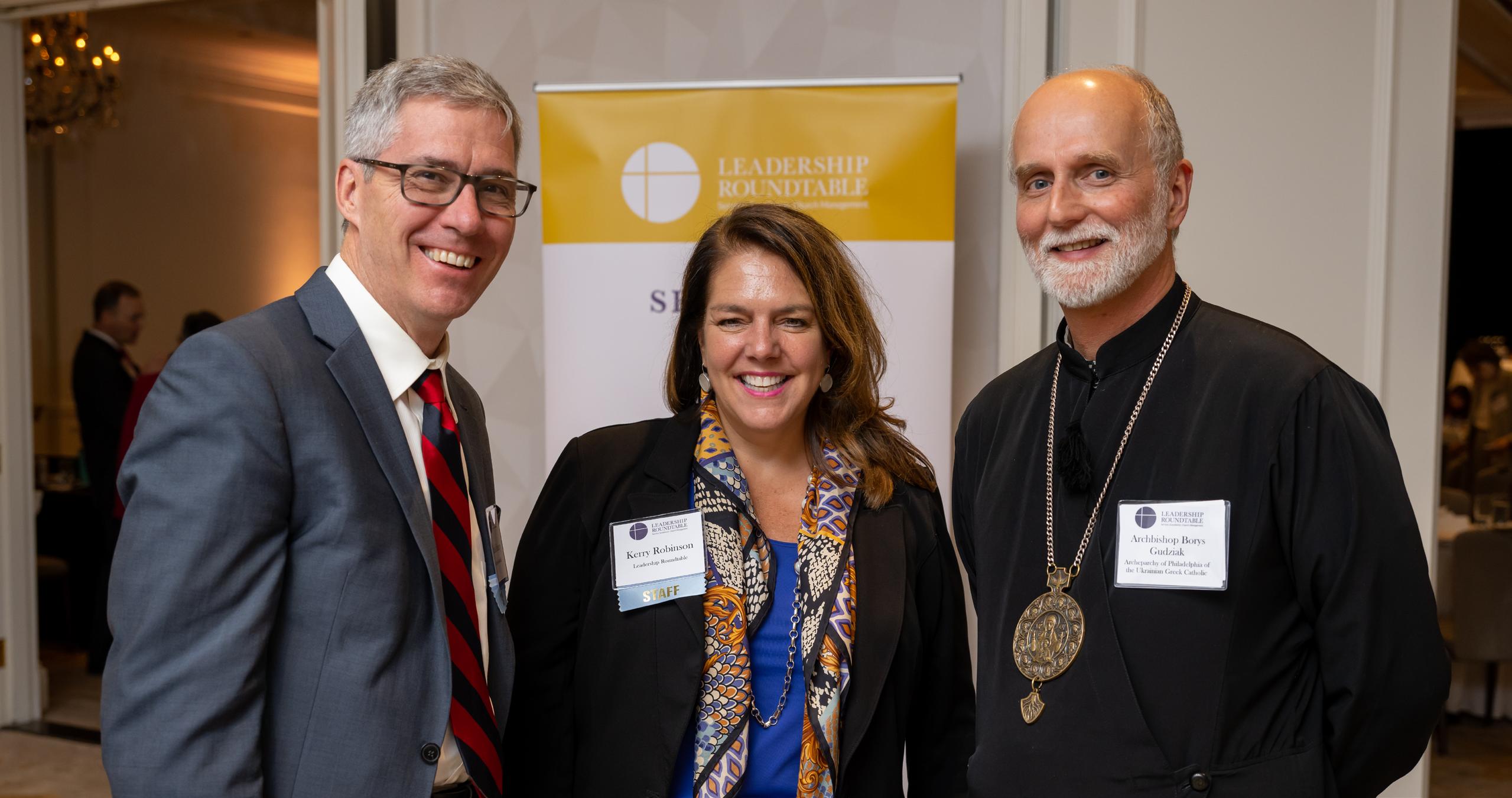
Archbishop Borys Gudziak
Ukrainian Catholic Archeparchy of Philadelphia
Archbishop Bernard Hebda Archdiocese of Saint Paul and Minneapolis
Archbishop William E. Lori Archdiocese of Baltimore
Archbishop Mitchell T. Rozanski Archdiocese of St. Louis
Bishop Mark L. Bartchak Diocese of Altoona-Johnstown
Bishop Steven R. Biegler Diocese of Cheyenne
Frank J. Caggiano
Diocese of Bridgeport
Bishop Arturo Cepeda Diocese of Detroit
Bishop Peter F. Christensen Diocese of Boise
Barry C. Knestout Diocese of Richmond
Bishop W. Shawn McKnight Diocese of Jefferson City
Bishop Edward B. Scharfenberger Diocese of Albany
Bishop David L. Toups Diocese of Beaumont
50
(left to right): Patrick Markey, Kerry Robinson, Archbishop Borys Gudziak
Leadership Roundtable WAYS TO GIVE 51 Donor Advised Funds Contact development@ leadershiproundtable.org for assistance Donate by Mail Make checks payable to: Leadership Roundtable 810 Oak Meadow Dr., Unit #681315 Franklin, TN 37068 Matching Gift through Employer Donate Online leadershiproundtable.org/give Stock or Mutual Funds Contact development@ leadershiproundtable.org for transfer instructions
2022 Summit Sponsors
PRESENTING SPONSORS
Geoffrey T. Boisi
Joseph Regan
BENEFACTOR SPONSORS
Dan and Kathleen Denihan
Elizabeth McCaul and Frank Ingrassia
PATRON SPONSORS
Dee and Kevin Conway
Kevin Fee
Mario J. Gabelli
Bryan and Stephanie Grane
Healey Family Foundation
Elaine and Ken Langone
The Leon and Toby Cooperman Family Foundation
The Lynch Foundation
Peggy and Gene McQuade
Dominic A. Tarantino
Anonymous
CATHOLIC LEADER SPONSORS
Kevin K. Carton
Catholic Health Association
The Catholic University of America
The Markey Family
Robert H. Niehaus
The Raskob Foundation for Catholic Activities
PARTNER SPONSORS
CAPTRUST Advisors
CCS Fundraising
Changing Our World, Inc.
Dr. Geno M. Fernandez
Gallagher | Global Religious Practice

Loyola University Chicago
ParishSOFT
The Pontifical Mission Societies in the U.S.
Brenda and Bob Popeo
Sacred Heart Seminary and School of Theology
Seton Hall University
INDIVIDUAL SPONSORS
Archdiocese of Louisville
Association of U.S. Catholic Priests
Rev. John P. Beal, JCD
Stephanie and Michael Brough
Burnett Risk Control International
Catholic Women Preach
Rob Crisci
Barbara Anne Cusack, JCD
The Hank Center for the Catholic Intellectual Heritage
John and Maureen Hurley
Susan and Mike King
Kinsale Consulting
The Honorable Michael Montelongo
Tom Nowak
Kerry Robinson and Michael Cappello
John A. Werwaiss
52
52

Catholic Partnership Summit Expanding the Tent: Young Adult Leadership and Co-Responsibility in the Catholic Church SAVE THE DATE Feb. 28 - March 1, 2024 Washington, D.C. summit.leadershiproundtable.org 53
In partnership with lay, ordained, and religious leaders and organizations across all sectors of the Catholic community in the United States and Rome, Leadership Roundtable seeks to elevate and implement best practices in management and leadership to establish a culture of co-responsible, servant leadership for a healthy, thriving Church in the U.S.
info@leadershiproundtable.org
leadershiproundtable.org
© 2023 Leadership Roundtable. All rights reserved.



 Elizabeth McCaul, Chair of the Board
Elizabeth McCaul, Chair of the Board



 Participants at the 2022 ESTEEM (Engaging Students to Enliven the Ecclesial Mission) Capstone Conference.
Participants at the 2022 ESTEEM (Engaging Students to Enliven the Ecclesial Mission) Capstone Conference.




















 28 Fatima Arroya (right) with Fr. Kevin Kennedy (left)
28 Fatima Arroya (right) with Fr. Kevin Kennedy (left)

 Chief Financial
Chief Financial












